新世纪研究生公共英语阅读b第十二单元课文翻译
研究生英语阅读教程(基础级2版)课文12及其翻译

Does Economic Growth (development) Improve Human Morale?By David G. Myers[1] During the mid-1980s my family and I spent a sabbatical year in the historic town of St. Andrews, Scotland. Comparing life there with life in America, we were impressed by a seeming disconnection between national wealth and well-being (happiness). To most Americans, Scottish life would have seemed Spartan. Incomes were about half that (income) in the U. S. Among families in the Kingdom of Fife surrounding (around) St. Andrews, 44 percent did not own a car, and we never met a family that owned two. Central heating in this place not far south of Iceland was, at that time, still a luxury.[2] In hundreds of conversations during our year there and during three half-summer stays since (since then), we repeatedly noticed that, despite (=in spite of) their simpler living, the Scots appeared no less joyful (happy) than Americans. We heard complaints about Margaret Thatcher, but never about being underpaid or unable to afford (pay for) wants (necessities). With less money there was no less satisfaction with living, no less warmth of spirit, no less pleasure (happiness) in one another's company. Are rich American is happier? [accompany sb. to somewhere][3] Within any country, such as our own, are rich people happier? In poor countries, such as Bangladesh and India, being relatively well off (rich) does make for (cause/ bring about) somewhat (a little) greater well being (happiness). Psychologically as well as (=and) materially, it is much better to be high caste than low caste. We humans need food, rest, warmth, and social contact.[4] But in affluent (rich) countries, where nearly everyone can afford life's necessities, increasing affluence matters (vi.) surprisingly little. In the USA, Canada, and Europe, the correlation between income and happiness is, as University of Michigan researcher Ronald Ingle-hart noted in 1980s 16-nation study, "surprisingly weak [indeed, virtually (actually) negligible]". Happiness is lower among the very poor. But once (they are) comfortable, more money provides diminishing returns. The second piece of pie, or the second $ 50, 000, never tastes as good as the first. So (As) far as happiness is concerned, it hardly matters (vi.) whether one drives a BMW or, like so many of the Scots, walks or rides a bus.[5] Even very rich people -- the Forbes' 100 wealthiest (richest) Americans surveyed by University of Illinois psychologist Ed Diener -- are only slightly happier than average (the ordinary people). With net (<->gross) worth all exceeding (surpassing) $ 100 million, providing ample (enough) money to buy things they don't need and hardly care about, 4 in 5 of the 49 people responding to the survey agreed that "Money can increase OR decrease happiness, depending on how it is used." And some (people) were indeed unhappy. One fabulously (extremely) wealthy man said he could never remember being happy. One woman reported that money could not undo (correct) misery caused by her children's problems. Does economic growth improve human morale? (net weight<->gross weight)[6] We have scrutinized (examined) the American dream of achieved wealth and well-being (happiness) by comparing rich and unrich countries, and rich and unrich people. That (analysis) leaves the final question: Over time (in the long run), does happiness rise (increase) with affluence (wealth)?[7] Typically (Absolutely) not. Lottery winners appear (seem) to gain (get) but (only) a temporary jolt of joy (happiness) from (because of) their winnings. Looking back, they feeldelighted (happy) to have won. Yet the euphoria doesn't last (vi.). In fact, previously enjoyed activities such as reading may become less pleasurable (pleasant). Compared to the high (high spirit) of winning a million dollars, ordinary pleasures (become) pale.[8] On a smaller scale, a jump in our income can boost (promote/ increase) our morale, for a while (a short time). "But in the long run," notes Inglehart, "neither an ice cream cone nor a new car nor becoming rich and famous produces(bring about)the same feelings of delight that it initially did. Happiness is not the result of being rich, but a temporary consequence (result) of having recently become richer." Ed Diener's research confirms that those whose incomes have increased over a 10-year period are not happier than those whose income has not increased. Wealth, it therefore seems, is like health: Although its utter (complete) absence can breed (produce/ lead to) misery, having it does not guarantee happiness. Happiness is less a matter of getting what we want than of wanting (enjoy) what we have.Are we happier today?[9] We can also ask whether, over time, our collective (total/ comprehensive) happiness has floated upward (increase) with the rising economic tide. Are we happier today than in 1940, when two out of five homes (families) lacked a shower or bathtub, heat often meant feeding a furnace wood or coal, and 35 percent of homes had no toilet? Or consider 1957, when economist John Galbraith was about to describe the United States as The Affluent Society. Americans' per person income, expressed in today's dollars, was less than $ 8,000. Today it is more than $ 16, 000, thanks to increased real wages into the 1970s, increased nonwage income, and the doubling of married women's employment. Compared to 1957, we are therefore "the doubly affluent society"—with double what money buys including twice as many cars per person, not to mention microwave ovens, big screen color TVs, home computers, and $ 200 billion a year spent in restaurants and bars -- two and a half times our 1960 inflation-adjusted restaurant spending per person. From 1960 to 1990, the percentage of us with·dishwashers zoomed from 7 to 45 percent, (zoom in=enlarge<->zoom out)·clothes dryers rose from 20 to 69 percent,·air conditioners soared from 15 to 70 percent.Not best of times (for) the human spirit (morale)[10] So, believing that a little more money would make us a little happier, and having seen our affluence ratchet upward little by little over nearly four decades, are we now happier?[11] We are not (happy at all). Since 1957, the number telling the University of Chicago's National Opinion Research Center that they are "very happy" has declined from 35 to 30 percent. Twice as rich, and a little less happy. In fact, between 1956 and 1988, the percentage of Americans saying they were "pretty (very) well satisfied with your present financial situation" dropped from 42 to 30 percent. [live/ lead a happy/ miserable life][12] We are also more often downright (completely) miserable. Among Americans born since World War II, depression has increased dramatically –tenfold (ten times), reports University of Pennsylvania clinical researcher Martin Seligman. Today's 25-year-olds are much more likely (possible) to recall a time in their life when they were despondent (depressed) and despairing than are their 75-year-old grandparents, despite the grandparents having had many more years to suffer all kinds of disorder, from broken legs to the anguish of depression. Researchers debate the actualextent (degree) of rising depression... but no matter how we define depression, the findings (discoveries) persist. Today's youth and young adults have grown up with much more affluence, slightly less overall happiness, and much greater risk of depression, not to mention tripled teen suicide and all the other social pathologies we have considered (discussed). Never has a culture (nation) experienced such physical comfort combined with such psychological misery. Never have we felt so free, or had our prisons so overstuffed. Never have we been so sophisticated (complicated) about pleasure, or so likely to suffer broken relationships.[13] These are the best of times materially, "a time of elephantine (great) vanity and greed" observes Garrison Keillor, but they are not the best times for the human spirit. William Bennett, no critic of free market economies, is among those who recognize (find) the futility (uselessness) of economics without ethics and money without a mission (goal/ purpose): "If we have full employment and greater economic growth -- if we have cities of gold and alabaster -- but our children have not learned how to walk in goodness, justice, and mercy, then the American experiment, not matter how gilded (beautiful), will have failed." (1, 208 words)ABOUT THE AUTHORDavid Myers is a social psychologist and a communicator (writer) of psychological science to college students and the general public.EXERCISESAnswer the following questions or complete the following statements.1. What struck the author during his stay in St. Andrews, Scotland?A. The historic town of St. Andrews, Scotland.B. Obvious disconnection between national wealth and well-being.C. The natural beauty of St. Andrews, Scotland.D. The unwealthy yet peaceful life in St. Andrews, Scotland.2. What did the Scots think about their simple life?A. They were unsatisfied with the simple life and complained a lot.B. They blamed Margaret Thatcher for the poor living standard.C. They never complained, though they were unable co afford wants.D. They were happy and satisfied with their simple life.3. What's the difference that affluence makes between poor countries and rich ones?A. In poor countries, affluence matters surprisingly little while in rich countries affluence matters a great deal.B. In poor countries, affluence doesn't matter while in rich countries affluence matters a great deal.C. Increasing affluence means the same for people both in rich countries and in poor ones.D. Affluence makes great difference in poor countries while it matters surprisingly little in rich ones.4. What does the author imply by "The second piece of pie never tastes as good as the first."?A. You will never have the same feeling if you are full.B. Driving a BMW is the same as walking or riding a bike once you have enough to eat.C. Once people have enough income for comfortable life, then more income provides diminishing returns.D. For the poor people they will not refuse to have something more.5. What is the attitude of the wealthiest Americans towards money and happiness?A. Money could either increase or decrease happiness, depending on how it is used.B. Money could increase or decrease happiness, depending on how much money one owns.C. Money could not bring happiness but troubles.D. Money could bring neither happiness nor troubles.6. According to the author, what is the consequence of becoming rich?A. Troubles.B. A high spirit.C. Miseries.D. Temporary happiness.7. Why does the author say that wealth is like health?A. Health and wealth are both blessings, yet having both does not ensure happiness.B. The more wealth one has, the happier one is.C. One will never be happy if he is rich, but in poor health.D. Both money and health are essential to happiness.8. What are the causes of the rising income of Americans?A. Increased real wages and decreased nonwage income.B. Decreased nonwage income and working women.C. Increased nonwage income and more married working women.D. Increased real wages but decreased married women's employment.9. What is culturally typical of today's American society?A. More affluent and more comfortable.B. Physical comfort combined with psychological misery.C. More affluent yet less comfortable.D. More affluent and less psychologically depressed.10. What's the main idea of the passage?A. Wealth can't ensure the improvement of human morale.B. People in poor countries enjoy life more than those do in poor countries.C. Human beings need both health and wealth in order to have a happy life.D. It is the best time for human wealth as well as happiness.II. VocabularyA. Choose the best word from the tour choices to complete each of the following sentences.1. In 1977, I took my first ever _____ year and spent a couple of months at the Australian National University in Canberra.A. underpaidB. sabbaticalC. prosperousD. affluent2. He has had _____ opportunity to exercise leadership, which he almost invariably directs along positive channels, and has improved in the various skills.A. ampleB. utter (complete/ thorough)C. messyD. greedy3. Presumably (perhaps) they are paid their _____ salaries to spot (look for) errors such as these.A. despairingB. fabulous (unbelievable)C. depressingD. sympathetic4. It still depends on flow-patterns, even when the air is so thin as to be almost _____.A. diminishingB. tripledC. negligibleD. perceivable (=comprehensive)5. This would carry with it a responsibility on their part to help devise (design) the tests, or atleast to _____ their content.A. boost (increase/ promote)B. breadC. guaranteeD. scrutinize (examine)6. But he was already affected (influenced) by a(n) _____ which induced courage and recklessness.A. euphoriaB. mission (task)C. (idea->) ideologyD. bewilderment (confusion)7. Not only was there physical weakness but also intense loneliness and sometimes mental_____ due to (because of) lack of occupation (job) in the "workhouse" (workshop/ factory/ company) and the chronic sick wards.A. moraleB. enthusiasmC. starvation (=hanger)D. anguish(extreme pain)8. Worst of all is the sense (feeling) of utter (thorough) _____ because it is far too late to change anything.A. luxuryB. possessionC. futilityD. dominance9. The (mode<->) mood was (desperate->) despairing, _____ and war-weary pathetic (poor/pitiful) rather than rebellious.A. deficientB. destructiveC. despondent (depressed)D. declining (fall)10. She was born friendly and intelligent with none of the _____ so often associated with beautiful women.A. vanityB. casteC. lotteryD. eternity (eternal: adj.)B. Choose the best word or expression from the list given for each blank. Use each word or expression only once and make proper changes where necessary.well off necessity diminish undo persistwell-being underpay downright zoom delight1. This suggests that Sterling's strength, unwelcome though it seemed, may actually have been conductive (helpful) to Britain's economic well-being (health/ development).2. The coal miners complain that they are ridiculously underpaid, especially as the work is so dangerous.3. We have seen the value of our house diminish substantially (considerably) over the last six months.4. It's very difficult to u ndo (correct) the damage that's caused by inadequate (improper) parenting (parental education) in a child's early years.5. The company's benefits zoomed (increase) from nil (zero/ naught) in 1981 to about $ 16 million last year. (zoom in=enlarge; zoom out)6. But she was an orphan, and the uncle and aunt with whom she lived were not at all well off (rich).7. For some women at this stage, cooking can become an absorbing (attractive) hobby rather than the necessity of life it was when there were others to feed -- a social pleasure or simply (only) a personal indulgence (favor/ preference).8. Those words uttered (spoken) by some political leaders would sound banal (cliché) and from one or two others downright phony (adj. n. false).9. Call your doctor for advice if symptoms persist for more than a few days.10. Yet there is much of scenic and historic interest here to delight (make sb. happy/ happiness)the leisurely visitor. (scene->scenery->scenic)III. ClozeThere are ten blanks in the following passage. Read the passage ea fully and choose the best answer front the four chokes given below the passage.Millions of people, especially in cities, find that life has become a dizzying and exhausting (tiring/ tiresome) rush (run). This is particularly (especially) so in Western lands (countries). At a recent meeting in the United States, a speaker asked his audience to 1 raise their hands if they felt tired much of the time (most of the time). Instantly, 2 a sea of hands went up. (If you can make it in New York, you can make it anywhere else; make it=succeed/ make a living) The book Why Am I So Tired? says: "Modern life is full oflist is endless."In years 4 gone (passed) by, life was simpler, and the pace of life was slower. People tended to live more peacefully (live in harmony). Daytime was for work, and nighttime was for one's family and for bed. Today, there are a number of reasons why people feel 5 increasingly tired and fatigued.One factor may be that people sleep less. And one of the more significant (important) developments that caused the change was the, 6 arrival of the electric light. With the flick of a humans could control the length of the "day", and people soon began 7(=sitting up late). Indeed, many had little choice in the matter because factories began to operate 8 around the clock and service industries extended their hours.Other technological radio, TV, and the personal computer, havealso played a role (part) in10 turn up (turn out/ appear) at work sleepy and tired after a long night's viewing (watching). Home computers, and the endless distractions that they offer, also tempt (attract) millions to stay up late.1. A. rise B. arise C. raise D. arouse2. A. a sea of B. a flock of C. a bunch of D. a band of3. A. interests B. advances C. tensions D. conflicts4. A. to come B. gone by C. to go D. passed away5. A. greatly B. intensively C. increasingly D. comprehensively6. A. display B. arrival C. demonstration D. announcement7. A. keeping on B. staying up C. sitting about D. standing for8. A. the clock round B. against the clock C. by the clock D. around the clock9. A. disturbing B. dividing C. detecting D. depriving10. A. tune in B. tear off C. turn up D. take inIV. TranslationPut the following ports into Chinese.1. To most Americans, Scottish life would have seemed Spartan. Incomes were about half that in the U. S. Among families in the Kingdom of Fife surrounding St. Andrews, 44 percent did notown a car, and we never met a family that owned two. Central heating in this place not far south of Iceland was, at that time, still a luxury.对绝大多数美国人而言,苏格兰人的生活可称得上清贫,其收入大约仅为美国人的一半。
新世纪研究生英语听说(下)原文LESSON 12(B)
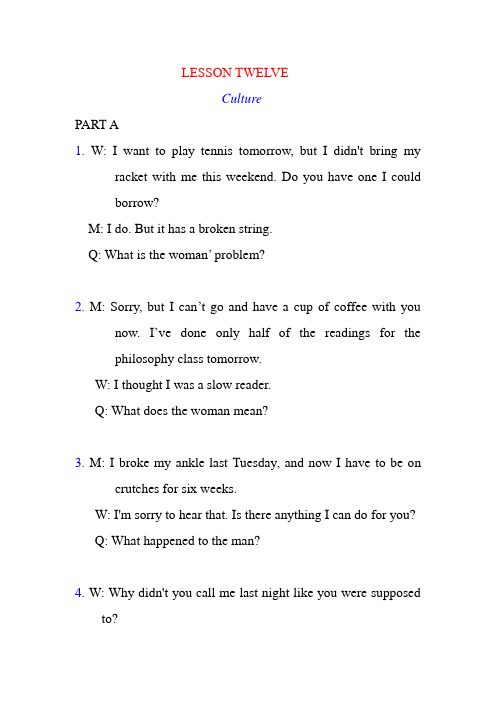
LESSON TWEL VECulturePART A1.W: I want to play tennis tomorrow, but I didn't bring myracket with me this weekend. Do you have one I couldborrow?M: I do. But it has a broken string.Q: What is the wo man’ problem?2.M: Sorry, but I can’t go and have a cup of coffee with younow. I’ve done only half of the readings for thephilosophy class tomorrow.W: I thought I was a slow reader.Q: What does the woman mean?3.M: I broke my ankle last Tuesday, and now I have to be oncrutches for six weeks.W: I'm sorry to hear that. Is there anything I can do for you?Q: What happened to the man?4. W: Why didn't you call me last night like you were supposedto?M: I did. Your line was busy.Q: What did the man try to do last night?5. M: Sue, would you like a sandwich or something?W: Oh, please don't bother. I can get something later.Q: What does the woman mean?6. M: This looks like the way to Susan's house, but I don't know.I wish I'd written down the directions.W: At this rate, we'll be lucky to get there in time for dessert.Q: What does the woman imply?7. W: So, did you pick up that orange juice for me like you saidyou would?M: I meant to, but I was short on cash. I'll be going back later, though, after I stop by the bank, if you can waitthat long.Q: What does the man imply he will do?8. M: That's a great dress, Cindy. I don't think I've ever seen youwear it before.W: Oh, I haven't. It's just been at the back of my closet. Mysister gave it to me ages ago and I had totally forgottenabout it.Q: Why hasn’t the woman worn the dress before?9.W: Just look at this apartment, Karen. What a mess! Yourstuff is all over. How does your roommate put up with it. W: I know. I haven't been doing my share this week, but I have three reports due on Friday and I haven't evenstarted one of them.Q: What can be inferred about Karen?10. W: I wish we had better stuff to read for our literature class.That novel she assigned us is so boring.M: Really? I started it yesterday afternoon and I couldn'tput it down until I finished it.Q: How does the man like the novel?11.W: Wow. You seem to be in a really good mood today.What's the secret?M: Don't know. I guess some mornings you wake up feeling great, some mornings you don't.Q: What does the man mean?12. W: If you're planning to take the train when you leave nextFriday, remember that I drive right past the station on myway home from campus.M: Say, I think I'll take you up on that.Q: What will the man probably do next Friday?13.M: I need to ask John about the Chemistry assignment fortomorrow, but his phone has been busy for the last hourand a half. Who could he be talking to for so long?W: It may not be him, you know. It could be one of his housemates. Why don't you just go over there if it'simportant?Q: What does the woman suggest the man do?14.W: Jim, I don't know if you know this, but I've decided torun for class president, and I was wondering if I ... , if Icould count on your vote.M: Oh. Maybe if you'd asked me sooner but my roommate is running too, and I've already promised him my support.Q: What will the man probably do?15.M: I might argue with some of the details, but I basicallyagree with this author's thesis about managing theeconomy.W: Sure, it sounds great in theory. My concern is whether it applies in practice.Q: What i s the woman’ implication?PART BPassage I:Beijing’s HutongsA hutong is an ancient city alley typical of Beijing. Surrounding the Forbidden City, many were built during the Yuan, Ming and Qing dynasties. In the prime of these dynasties the emperors, in order to establish supreme power for themselves, planned the city and arranged the residential areas according to the etiquette systems of the Zhou Dynasty. The center of the city of Beijing was the royal palace -- the Forbidden City. One kind of hutong, usually referred to as the regular hutong, was near the palace to the east and west and arranged in orderly fashion along the streets. Most of the residents of these hutongs were imperial kinsmen and aristocrats. Another kind, the simple and crude hutong, was mostly located far to the north and south of the palace.The main buildings in the hutong were almost all quadrangles--a building complex formed by four houses around a quadrangular courtyard. The quadrangles varied in size and design according to the social status of the residents. The big quadrangles of high-ranking officials and wealthy merchants were specially built with roof beams and pillars all beautifully carved and painted, each with a front yard and back yard. However, the ordinary people's quadrangles were simply built with small gates and low houses. Hutongs, in fact, are passageways formed by many closely arranged quadrangles of different sizes. The specially built quadrangles all face south for better lighting; as a result, a lot of hutongs run from east to west. Between the big butongs many small ones go north and south for convenient passage.In recent years, the houses in many hutongs have been pulled down and replaced by modern buildings. Many hutong dwellers have moved to new housing. In the urban district of Beijing today, houses along hutongs still occupy one third of the total area. The hutong today is fading into the shade for both tourists and inhabitants.I1. How did the emperors plan the city and arrange the residentialareas?2. Who lived near the palace to the east and west?3. Where were simple and crude hutongs mostly located?4. What do you know about the ordinary people's quadrangles?5.What is the percentage of the houses along hutongs in the urban district of Beijing today?II1. (T) Many hutongs surrounding the Forbidden City were builtduring the Yuan, Ming and Qing dynasties.2.(F) A Hutong is a building complex formed by four housesaround a quadrangular courtyard.3. (T) The specially built quadrangles of high ranking officialsand wealthy merchants all faced south for better lighting.4.(T) Small hutongs between big ones go north and south forconvenient passage.5. (F) The hutong today is only reserved for tourists.Passage II:The White Wedding DressMost American brides choose to be married in white. The color has long been associated with wedding because of its supposed symbolic link to virginity. Viewed historically, the linkbetween white and virginity is not as absolute as is often supposed. Brides in ancient Rome married in white, but because the color signified joy. They were veiled in a bright orange veil, which suggested the flames of passion. In the western Catholic tradition, too, white has always been the color of joy. In some other societies, white is used to denote the significance of various ceremonies, among them funerals as well as weddings. For example, among the Andaman Islanders, white indicates simply a change of status; and for the traditional Chinese it is a symbolic representation of hope in funerals. Chinese brides usually wear a red dress in the wedding ceremony.The "traditional" white wedding dress, moreover, is a recent innovation. It did not become popular until about the early 19th century. Its popularity may be due less to its association with virginity than to showing off one's privilege. Most Victorian brides wore traditional national costumes. The white dress, an impractical innovation, became popular among the upper classes precisely because of its defects: Victorian brides from privileged backgrounds wore white to indicate that they were rich enough to wear a dress for one day only. Later, the white wedding dress also became popular among brides from somewhat less privileged backgrounds, but till the first partof the 20th century they would put on their white dress on special occasions throughout the first year of their marriage. The custom of locking it away after the wedding is less than a hundred years old.I1. What is "white" often supposed to be associated with?2. What does "white" indicate in the western Catholic tradition?3. When did the white wedding dress become popular?4.Why was the white wedding dress popular among the upper class people?5.When did the custom begin of locking the white wedding dress away after the wedding?II1. (T) Most American brides choose to be married in white.2.(F) Brides in ancient Rome married in white because thecolor signified hope.3.(T) For the traditional Chinese "white" is a symbolicrepresentation of hope in funerals.4. (F) Most Victorian brides wore a white wedding dress duringtheir wedding ceremonies.5. (T) The white wedding dress has now become popular amongordinary people.Passage III:Customary Behavior for GuestsPresents if you're invited to someone's home for a meal it is customary to take some flowers or a box of chocolates. It is not customary to take a bottle of wine unless you know your host well. Although chocolates and flowers are quite acceptable it would be very nice if you could take something from your country. It is different if you are invited to a party, and it also depends on what kind of party it is. Many parties these days are "bring a bottle" parties.Dress If you aren't sure what you should wear then ask your host or your friends. Usually dress is informal in Britain for parties and for invitations to dinner in people's homes. If you are going to an expensive restaurant the men may have to wear a jacket and tie, jeans wouldn't be allowed.Punctuality If you are invited to dinner at someone's home you shouldn't arrive earlier than the time given and you shouldn't arrive more than 15 minutes late. If you are going to be late telephone and let your host know so that the meal can be delayed. Dinner is usually served between 8 pm and 9 pm. Very often guests are invited to arrive earlier than this so that they canhave a drink and be introduced to the other guests.PART D1) enter politics, 2) a vision, 3) attractive, 4) our sense of shame, 5)appalled, 6)violent crime, 7)reestablish, 8) a sense of family, 9)African-American soldier, 10) Are you afraid?", 11) with my family, 12) take care of, 13) touch me, 14) as a nation, 15)as a family, 16)sharing with each other, 17)the can-do attitude, 18) risk failing, 19) who has received so much, 20) our American journey。
新世纪研究生公共英语教材阅读B课文翻译
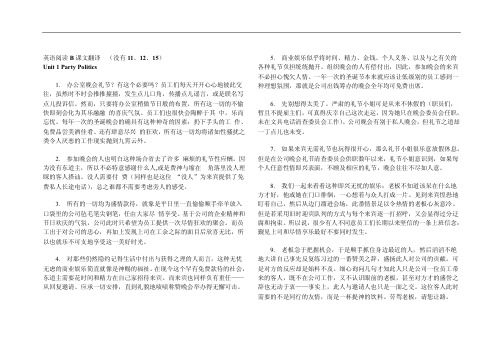
� 。排 安来洽融系关否是间互相个照按样那单名柬请象不也间事同中作工且而 �系关密亲的间之人家了响影经已作工出外为因 。好更会果效加参友朋或偶 配工员请邀是但。行举内间时班上在并�加参工员部内于限只以可会晚司 公(。名姓的友朋或偶配的行同写填己自工员让以可过不。事的楚清查以难 到感都主雇的智明位一何任和姐小节礼令是会晚席出伴结谁和谁 .02
。人的 出付谢感该应到识意�说是就也——番一谢回该应到识意会也人客的懂懵 最是使即�时此。临光的他谢感�手的宾来的开离想位每住握�处口出的 眼抢在站地动不也动一们板老时此。列队客送个一外另需还�后最.52 。题话的外之作工谈高何如得懂工员该出现表以可样这 为因�围解司上的面局尬尴入陷替是而�司上求恳是不会机正真的升晋途 仕求寻工员外另。堪难很会为行种这光目的客好人主于碍中会晚人私在但 �责指人无法做的酒喝少量尽或绝拒中会晚司公在。点点指指人被会不就 点一守保稍稍得穿道知们他为因�样一司上与得穿会工员的明聪 .42
在�道报的局计统家国国法据。的低最中录记的年 061 在率婚结的国英 在现。话的婚结要还们他果如——了晚更也婚结且并了多更婚离、了长更 命寿们他为因�活生自独入步在人洲欧的多越来越。击冲大巨生产活生私 的人洲欧对都军大业产入进女妇量大及以性动流到渡过性定稳从化文业商 、命革的术技信通。分部成组的势趋义主人个的拒抗可不纪世个上是渡过 的式模活生身独到活生庭家从种这论评曼夫考·特劳克·让家学会社国法 。迎欢遍普的人类这商告广和商展发产地房、家学口人到受�象气新济经洲 欧是而�考思生人的观悲是不这。活生身独过定决就候时的轻年很在人洲 欧的多越来越是但。人一独单是将都终最们我�言所们人圣如正 .3 ” 。长成地扰干受不并择选权有人个一为作我。省反我自间空和间时有我使 活生自独是但。往交人与欢喜我�交社恶厌不我“ �说她。活生身单着论谈 地溢洋情热中歇间的话电打在�机手着抓手一另�盘向方着扶手一�风着 兜黎巴在地速快车汽小牌 ITG floG 国德的亮漂着开她。果结的功成业事 是成看寓公的己自和活生立独有拥把她 �家行银黎巴的岁 92 个是莱戈尔 克·白莎丽伊 。人的样这莱戈尔克 ·白莎丽伊像是而�夫鳏和女处老的槁枯 容面些那去过像再不族身单的在现。了返复不去一经已子日些那 .2
新世纪研究生公共英语教材阅读B课文翻译第9.10.13.14单元
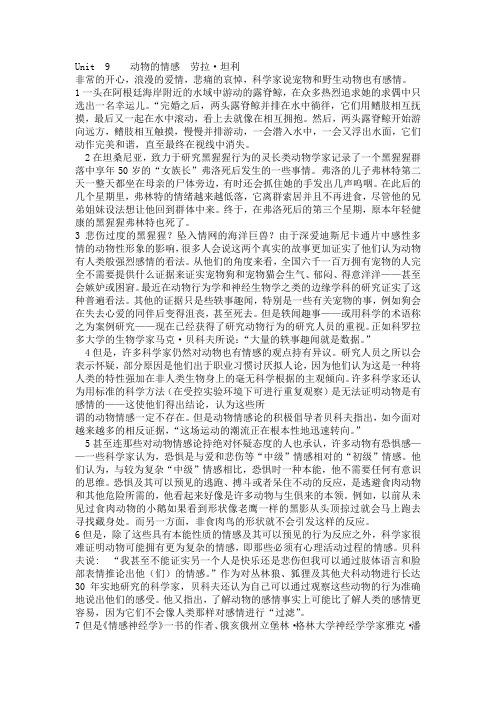
Unit 9 动物的情感劳拉·坦利非常的开心,浪漫的爱情,悲痛的哀悼,科学家说宠物和野生动物也有感情。
1一头在阿根廷海岸附近的水域中游动的露脊鲸,在众多热烈追求她的求偶中只选出一名幸运儿。
“完婚之后,两头露脊鲸并排在水中徜徉,它们用鳍肢相互抚摸,最后又一起在水中滚动,看上去就像在相互拥抱。
然后,两头露脊鲸开始游向远方,鳍肢相互触摸,慢慢并排游动,一会潜入水中,一会又浮出水面,它们动作完美和谐,直至最终在视线中消失。
2在坦桑尼亚,致力于研究黑猩猩行为的灵长类动物学家记录了一个黑猩猩群落中享年50岁的“女族长”弗洛死后发生的一些事情。
弗洛的儿子弗林特第二天一整天都坐在母亲的尸体旁边,有时还会抓住她的手发出几声呜咽。
在此后的几个星期里,弗林特的情绪越来越低落,它离群索居并且不再进食,尽管他的兄弟姐妹设法想让他回到群体中来。
终于,在弗洛死后的第三个星期,原本年轻健康的黑猩猩弗林特也死了。
3悲伤过度的黑猩猩?坠入情网的海洋巨兽?由于深爱迪斯尼卡通片中感性多情的动物性形象的影响,很多人会说这两个真实的故事更加证实了他们认为动物有人类般强烈感情的看法。
从他们的角度来看,全国六千一百万拥有宠物的人完全不需要提供什么证据来证实宠物狗和宠物猫会生气、郁闷、得意洋洋——甚至会嫉妒或困窘。
最近在动物行为学和神经生物学之类的边缘学科的研究证实了这种普遍看法。
其他的证据只是些轶事趣闻,特别是一些有关宠物的事,例如狗会在失去心爱的同伴后变得沮丧,甚至死去。
但是轶闻趣事——或用科学的术语称之为案例研究——现在已经获得了研究动物行为的研究人员的重视。
正如科罗拉多大学的生物学家马克·贝科夫所说:“大量的轶事趣闻就是数据。
”4但是,许多科学家仍然对动物也有情感的观点持有异议。
研究人员之所以会表示怀疑,部分原因是他们出于职业习惯讨厌拟人论,因为他们认为这是一种将人类的特性强加在非人类生物身上的毫无科学根据的主观倾向。
研究生公共英语教材阅读B第3、4、10、11、14课文原文及翻译
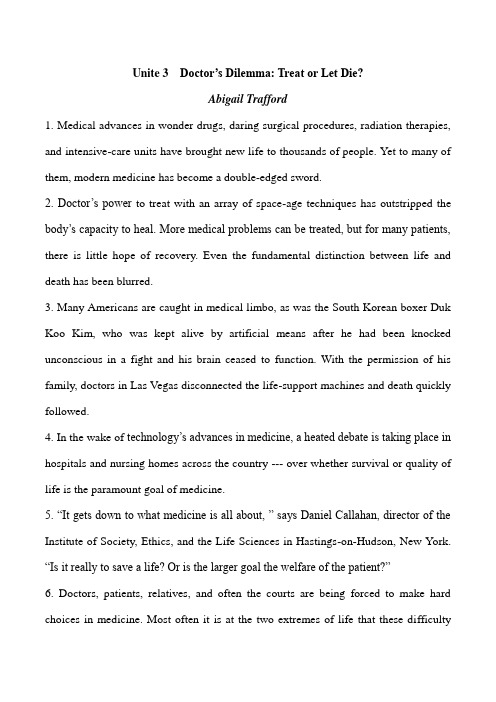
Unite 3 Doctor’s Dilemma: Treat or Let Die?Abigail Trafford1. Medical advances in wonder drugs, daring surgical procedures, radiation therapies, and intensive-care units have brought new life to thousands of people. Yet to many of them, modern medicine has become a double-edged sword.2. Doctor’s power to treat with an array of space-age techniques has outstripped the body’s capacity to heal. More medical problems can be treated, but for many patients, there is little hope of recovery. Even the fundamental distinction between life and death has been blurred.3. Many Americans are caught in medical limbo, as was the South Korean boxer Duk Koo Kim, who was kept alive by artificial means after he had been knocked unconscious in a fight and his brain ceased to function. With the permission of his family, doctors in Las Vegas disconnected the life-support machines and death quickly followed.4. In the wake of technology’s advances in medicine, a heated debate is taking place in hospitals and nursing homes across the country --- over whether survival or quality of life is the paramount goal of medicine.5. “It gets down to what medicine is all about, ” says Daniel Callahan, director of the Institute of Society, Ethics, and the Life Sciences in Hastings-on-Hudson, New York. “Is it really to save a life? Or is the larger goal the welfare of the patient?”6. Doctors, patients, relatives, and often the courts are being forced to make hard choices in medicine. Most often it is at the two extremes of life that these difficultyethical questions arise --- at the beginning for the very sick newborn and at the end for the dying patient.7. The dilemma posed by modern medical technology has created the growing new discipline or bioethics. Many of the country’s 127 medical s chools now offer courses in medical ethics, a field virtually ignored only a decade ago. Many hospitals have chaplains, philosophers, psychiatrists, and social workers on the staff to help patients make crucial decisions, and one in twenty institutions has a special ethics committee to resolve difficult cases.Death and Dying8. Of all the patients in intensive-care units who are at risk of dying, some 20 percent present difficult ethical choices --- whether to keep trying to save the life or to pull back and let the patient die. In many units, decisions regarding life-sustaining care are made about three times a week.9. Even the definition of death has been changed. Now that the heart-lung machine can take over the functions of breathing and pumping blood, death no longer always comes with the patient’s “last gasp” or when the heart stops beating. Thirty-one states and the District of Columbia have passed brain-death statutes that identify death as when the whole brain ceases to function.10. More than a do zen states recognize “living wills” in which the patients leave instructions to doctors not to prolong life by feeding them intravenously or by other methods if their illness becomes hopeless. A survey of California doctors showed that 20 to 30 percent were following instructions of such wills. Meanwhile, the hospicemovement, which its emphasis on providing comfort --- not cure --- to the dying patient, has gained momentum in many areas.11. Despite progress in society’s understanding of death and dying, t heory issues remain. Example: A woman, 87, afflicted by the nervous-system disorder of Parkinson’s disease, has a massive stroke and is found unconscious by her family. Their choices are to put her in a nursing home until she dies or to send her to a medical center for diagnosis and possible treatment. The family opts for a teaching hospital in New York city. Tests show the woman’s stroke resulted from a blood clot that is curable with surgery. After the operation, she says to her family: “Why did you bring me back to this agony?” Her health continues to worsen, and two years later she dies.12. On the other hand, doctors say prognosis is often uncertain and that patients, just because they are old and disabled, should not be denied life-saving therapy. Ethicists also fear that under the guise of medical decision not to treat certain patients, death may become too easy, pushing the country toward the acceptance of euthanasia.13. For some people, the agony of watching high-technology dying is too great. Earlier this year, Woodrow Wilson Collums, a retired dairyman from Poteet, Texas, was put on probation for the mercy killing of his older brother Jim, who lay hopeless in his bed at a nursing home, a victim of severe senility resul ting from Alzheimer’s disease. After the killing, the victim’s widow said: “I think God, Jim’s out of his misery. I hate to think it had to be done the way it was done, but I understand it. ”Crisis in Newborn Care14. At the other end of the life span, technology has so revolutionized newborn carethat it is no longer clear when human life is viable outside the womb. Newborn care has got huge progress, so it is absolutely clear that human being can survive independently outside the womb. Twenty-five years ago, infants weighting less than three and one-half pounds rarely survived. The current survival rate is 70 percent, and doctors are “salvaging” some babies that weigh only one and one-half pounds. Tremendous progress has been made in treating birth deformities such as spina bifida. Just ten years ago, only 5 percent of infants with transposition of the great arteries --- the congenital heart defect most commonly found in newborns --- survived. Today, 50 percent live.15. Yet, for many infants who owe their lives to new medical advances, survival has come at a price. A significant number emerge with permanent physical and mental handicaps.16. “The question of treatment and nontreatment of seriously ill newborns is not a single one,”says Thomas Murray of the Hastings Center. “But I feel strongly that retardation or the fact that someone is going to be less than perfect is not good grounds for allowing an infant to die.”17. For many parents, however, the experience of having a sick newborn becomes a lingering nightmare. Two years ago, an Atlanta mother gave birth to a baby suffering from Down’s Syndrome, a form of mental retardation; the child also had blocked intestines. The doctors rejected the parents’ plea not to operate, and today the child, severely retarded, still suffers intestinal problems.18. “Every time Melanie has a bowel movement, she cries,” explains her mother.“She’s not able to take care of herself, and we won’t live forever. I wanted to save her from sorrow, pain, and suffering. I don’t understand the emphasis on life at all costs, and I’m very angry at the doctors and the hospital. Who will take care of Melanie after we’re gone? Where will you doctors be then?”Changing Standards19. The choices posed by modern technology have profoundly changed the practice of medicine. Until now, most doctors have been activists, trained to use all the tools in their medical arsenals to treat disease. The current trend is toward nontreatment as doctors grapple with questions not just of who should get care but when to take therapy away.20. Always in the background is the threat of legal action. In August, two California doctors were charged with murdering a comatose patient by allegedly disconnecting the respirator and cutting off food and water. In 1981, a Massachusetts nurse was charged with murdering a cancer patient with massive doses of morphine but was subsequently acquitted.21. Between lawsuits, government regulations, and patients’ rights, many doctors feel they are under siege. Modern technology actually has limited their ability to make choices. More recently, these actions are resolved by committees.Public Policy22. In recent years, the debate on medical ethics has moved to the level of national policy. “It’s just beginning to hit us that we don’t have unlimited resources,” says Washington Hospital Center’s Dr. Lynch. “You can’t talk about ethics without talkingethics without talking about money.”23. Since 1972. Americans have enjoyed unlimited access to a taxpayer-supported, kidney dialysis program that offers life-prolonging therapy to all patients with kidney failure. To a number of police analysts, the program has grown out of control --- to a $1.4billion operation supporting 61,000 patients. The majority are over 50, and about a quarter have other illness, such as cancer or heart disease, conditions that could exclude them from dialysis in other countries.24. Some hospitals are pulling back from certain lifesaving treatment. Massachusetts General Hospital, for example, has decided not perform heart transplants on the ground that the high costs of providing such surgery help too few patients. Burn units --- through extremely effective --- also provide very expensive therapy for very few patients.25. As medical scientists push back the frontiers of therapy, the moral dilemma will continue to grow for doctors and patients alike, making the choice of to treat the basic question in modern medicine.1. 在特效药、风险性手术进程、放疗法以及特护病房方面的医学进展已为数千人带来新生。
新世纪研究生公共英语教材阅读B课文原文及翻译
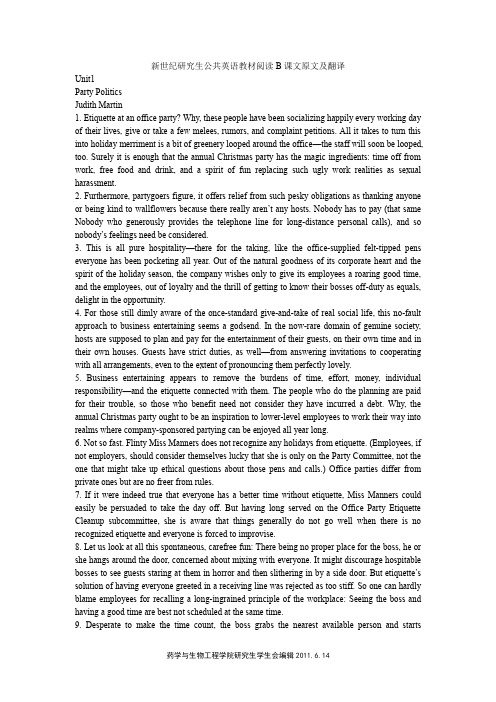
新世纪研究生公共英语教材阅读B课文原文及翻译Unit1Party PoliticsJudith Martin1. Etiquette at an office party? Why, these people have been socializing happily every working day of their lives, give or take a few melees, rumors, and complaint petitions. All it takes to turn this into holiday merriment is a bit of greenery looped around the office—the staff will soon be looped, too. Surely it is enough that the annual Christmas party has the magic ingredients: time off from work, free food and drink, and a spirit of fun replacing such ugly work realities as sexual harassment.2. Furthermore, partygoers figure, it offers relief from such pesky obligations as thanking anyone or being kind to wallflowers because there really aren‟t any hosts. Nobody has to pay (that same Nobody who generously provides the telephone line for long-distance personal calls), and so nobody‟s feelings need be considered.3. This is all pure hospitality—there for the taking, like the office-supplied felt-tipped pens everyone has been pocketing all year. Out of the natural goodness of its corporate heart and the spirit of the holiday season, the company wishes only to give its employees a roaring good time, and the employees, out of loyalty and the thrill of getting to know their bosses off-duty as equals, delight in the opportunity.4. For those still dimly aware of the once-standard give-and-take of real social life, this no-fault approach to business entertaining seems a godsend. In the now-rare domain of genuine society, hosts are supposed to plan and pay for the entertainment of their guests, on their own time and in their own houses. Guests have strict duties, as well—from answering invitations to cooperating with all arrangements, even to the extent of pronouncing them perfectly lovely.5. Business entertaining appears to remove the burdens of time, effort, money, individual responsibility—and the etiquette connected with them. The people who do the planning are paid for their trouble, so those who benefit need not consider they have incurred a debt. Why, the annual Christmas party ought to be an inspiration to lower-level employees to work their way into realms where company-sponsored partying can be enjoyed all year long.6. Not so fast. Flinty Miss Manners does not recognize any holidays from etiquette. (Employees, if not employers, should consider themselves lucky that she is only on the Party Committee, not the one that might take up ethical questions about those pens and calls.) Office parties differ from private ones but are no freer from rules.7. If it were indeed true that everyone has a better time without etiquette, Miss Manners could easily be persuaded to take the day off. But having long served on the Office Party Etiquette Cleanup subcommittee, she is aware that things generally do not go well when there is no recognized etiquette and everyone is forced to improvise.8. Let us look at all this spontaneous, carefree fun: There being no proper place for the boss, he or she hangs around the door, concerned about mixing with everyone. It might discourage hospitable bosses to see guests staring at them in horror and then slithering in by a side door. But etiquette‟s solution of having everyone greeted in a receiving line was rejected as too stiff. So one can hardly blame employees for recalling a long-ingrained principle of the workplace: Seeing the boss and having a good time are best not scheduled at the same time.9. Desperate to make the time count, the boss grabs the nearest available person and startsdelivering practiced words about the contribution he makes to their great enterprise. The reaction is not quite what was hoped for. Discreet questioning establishes that this is an employee‟s guest. He doesn‟t work for the company, recognize the boss, or appreciate the attention—and, as a matter of fact, has only a passing acquaintance with the employee who issued the invitation. What this guest wants is not professional fellowship but a fresh drink, if the boss would kindly step out of the way.10. Now, the reason the invitation said “and guest” was to avoid the ticklish issue of who is still married to whom and what the spouse calls itself. Last year, unmarried employees were furious when their partners were not included, and married employees complained that the forms by which their spouses were addressed were offensive: “Mrs.” offended women who preferred “Ms.,” and wives who had the same surnames outraged everybody who didn‟t. This year, the complaints will be from spouses who were not told that there was a party or who were told that spouses weren‟t invited—but found out otherwise. There won‟t be many complaints. They will, however, be memorable, darkly charging the company with promoting immorality.11. Meanwhile, what about those who are interested in promoting a bit of immorality, or just plain romance, of their own? They, too, are creating problems that will reach far into the new year. True office romances are the least of them, with their charges of favoritism and melding professional and personal time. More serious is the fact that, in spite of the liquor and high spirits, it still counts as sexual harassment when anyone with supervisory powers makes unreciprocated overtures to a lower-ranking employee. And foolhardy when a lower-ranking employee annoys a higher-ranking one.12. Some employees have their minds only on business and will be spending party time actively promoting workaday concerns. Remembering the company rhetoric about open communications and all being in this together, they will actually seek out the boss, who by this time is grateful to be addressed by anyone at all.13. But they do n‟t want to engage in platitudes. They accept compliments with: “Well, then how about a raise?” They plead for promotions, explain confidentially who ought to be fired, and advance previously submitted ideas about revolutionizing the business that have been unaccountably unappreciated for years. In one evening, they manage to cut through the entire hierarchy and procedures the boss has painstakingly established for the purpose of being spared this kind of importuning.14. Eventually—usually somewhat late in the party—it occurs to someone that this informal setting is just the time to offer the boss some constructive personal criticism. What else does talking frankly and informally mean but an invitation to unload opinions without any career consequence?15. Here is where the company has pulled a fast one on its employees. “Go ahead,” it has said, “relax, have a good time, forget about the job.” And the naive have taken this at face value. This event is called a party—a place where one lets loose without worrying about being judged by the cold standard of professional usefulness.16. Even employees who adhere strictly to standard business dress in the office may not know what the bosses might consider vulgar in evening wear. Here is a chance to show off their racy and imaginative off-duty clothes. But over there are supervisors murmuring that people who look like that can‟t really be sent out to represent the company.17. Worse are the comments on anyone whose idea of fun is a little boisterous. It may be just thebehavior that makes one a delight—or a trial—to one‟s friends. But here, it is not being offered for the delight or tolerance of friends. It is being judged on criteria other than whether the person is a riot.18. It is not that Miss Manners wants to spoil the office party by these warnings. She just wants to prevent it from spoiling careers. And the solution is what was banished from the party for being too inhibiting: etiquette.19. The first formality that must come back is inviting everyone by name. The practice of merely counting every invitation as two is as dangerous as it is unflattering. But people who have been clearly identified and told that they must respond—the suggestion must be made neutrally, to show that the party is a treat, not a requirement—already have some sense that they are both individually sought after and expected to be responsible.20. What constitutes a couple is a murkier question than Miss Manners and any sensible employer ought to investigate, but employees simply can be asked to supply the name of a spouse or friend they want to invite. (An office party can be limited by confining it to employees, in which case it should be held during office hours. But inviting spouses and such is better. Having to work is enough distract ion from one‟s more intimate relationships, and the staff was not compiled like a guest list, according to personal compatibility.21. Since we have established, Miss Manners hopes, that the point of an office party is not whooping it up or telling people off, what is it? It is showing appreciation of the staff.22. This starts with a well-run receiving line. However much popular opinion may regard receiving lines as nasty ordeals, they were invented to be, and remain, the easiest way to get everyone recognized by the key people. The oldest receiving-line trick in the world still works: Someone whose business it is to know everyone—or someone unimportant enough to be able to ask each guest his name—announces the guests to the host as they go through the line. The host can then scornfully declare: “Of course I know Annette. We couldn‟t run this place without her.” For extra charm, the employee‟s guest is also told how wonderful that employee is. This always seems more sincere than straight-out flattery, and from then on, whenever the employee complains that everyone at the office is an idiot, the spouse will counter by repeating that appreciation.23. It is often erroneously assumed that the style of the party ought to be what employees are used to: their own kind of music, food, and other things the executive level believes itself to have outgrown. Nonsense. What employees want is a taste of high-level entertaining. This may vary greatly according to the nature of the business. If, however, the party is too formal for the employees‟ taste, they‟ll get a good laugh and enjoy the contrast all the more when they continue partying on their own afterward.24. The clever employee will dress as the executives do, keeping in mind that there are few fields in which people are condemned for looking insufficiently provocative. Refusing or limiting drinks is not the handicap at business parties that it may be under the overly hospitable eye of a private host. And the real opportunity for career advancement is not petitioning a boss but rescuing one who has been cornered or stranded, thus demonstrating that one knows how to talk charmingly about nonbusiness matters.25. At the end, there is another receiving line. That is, the bosses plant themselves conspicuously by the exit, grabbing the hand of anyone trying to get away and thanking him for coming. Even the dimmest guest will then realize it is appropriate to thank back—that is, to realize that something has been offered and deserves gratitude.26. After all, isn‟t that why the office Christmas party is given?27. If the only goal were for the company to show the staff its appreciation, this could be effectively done with a day off and a bonus to go with it.第一单元晚会之道朱迪丝•马丁1. 办公室晚会礼节?有这个必要吗?员工们每天开开心心地彼此交往,虽然时不时会推推撞撞,发生点儿口角,传播点儿谣言,或是联名写点儿投诉信。
新世纪研究生英语公共英语阅读B课后翻译答案
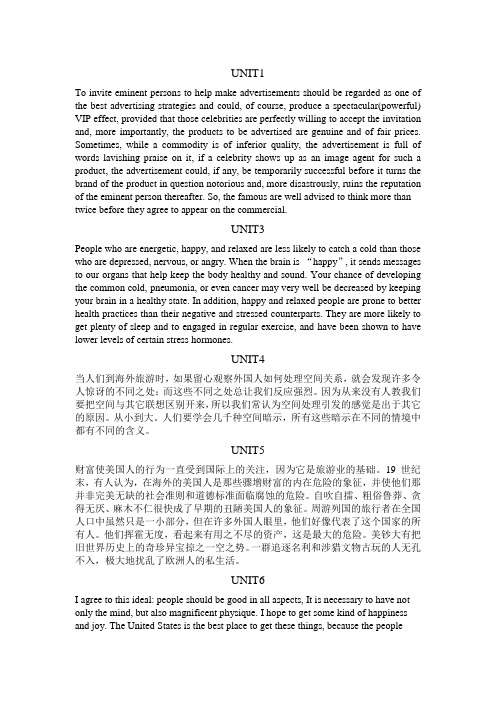
UNIT1To invite eminent persons to help make advertisements should be regarded as one of the best advertising strategies and could, of course, produce a spectacular(powerful) VIP effect, provided that those celebrities are perfectly willing to accept the invitation and, more importantly, the products to be advertised are genuine and of fair prices. Sometimes, while a commodity is of inferior quality, the advertisement is full of words lavishing praise on it, if a celebrity shows up as an image agent for such a product, the advertisement could, if any, be temporarily successful before it turns the brand of the product in question notorious and, more disastrously, ruins the reputation of the eminent person thereafter. So, the famous are well advised to think more than twice before they agree to appear on the commercial.UNIT3People who are energetic, happy, and relaxed are less likely to catch a cold than those who are depressed, nervous, or angry. When the brain is “happy”, it sends messages to our organs that help keep the body healthy and sound. Your chance of developing the common cold, pneumonia, or even cancer may very well be decreased by keeping your brain in a healthy state. In addition, happy and relaxed people are prone to better health practices than their negative and stressed counterparts. They are more likely to get plenty of sleep and to engaged in regular exercise, and have been shown to have lower levels of certain stress hormones.UNIT4当人们到海外旅游时,如果留心观察外国人如何处理空间关系,就会发现许多令人惊讶的不同之处;而这些不同之处总让我们反应强烈。
新世纪研究生公共英语教材B阅读理解课后答案及听力B案
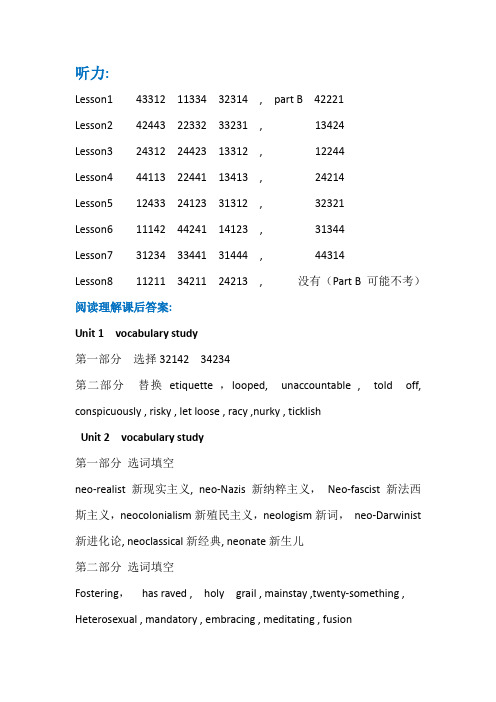
听力:Lesson1 43312 11334 32314 , part B 42221Lesson2 42443 22332 33231 , 13424Lesson3 24312 24423 13312 , 12244Lesson4 44113 22441 13413 , 24214Lesson5 12433 24123 31312 , 32321Lesson6 11142 44241 14123 , 31344Lesson7 31234 33441 31444 , 44314Lesson8 11211 34211 24213 , 没有(Part B 可能不考)阅读理解课后答案:Unit 1 vocabulary study第一部分选择32142 34234第二部分替换etiquette ,looped, unaccountable , told off, conspicuously , risky , let loose , racy ,nurky , ticklishUnit 2 vocabulary study第一部分选词填空neo-realist 新现实主义, neo-Nazis 新纳粹主义,Neo-fascist 新法西斯主义,neocolonialism新殖民主义,neologism新词,neo-Darwinist 新进化论, neoclassical新经典, neonate新生儿第二部分选词填空Fostering,has raved , holy grail , mainstay ,twenty-something , Heterosexual , mandatory , embracing , meditating , fusionUnit3 vocabulary study第一部分替换Outstrip ,limbo ,ceased ,in the wake of , paramount ,ethical , prolonged ,thorny ,congenital, subsequently第二部分选词填空Euthanasia ,salvaged ,deformity ,defects ,handicaps , lingering ,grapple ,allegedly , acquitted ,frontiersUnit4 vocabulary study第一部分连线1B 2E 3G 4J 5A 6H 7C 8I 9F 10D第二部分选词填空Anthropologists , patterns , tangible , persistent , infringe , integrate, secular , spatial , florist’s , architectureUnit5 vocabulary study第一部分连线1d 2e 3i 4g 5j 6h 7f 8a 9b 10c第二部分选词填空Provocative , notional , curb , devastating, appalling , perspective ,counterpart ,fray , defuse , frustratedUnit6 vocabulary study第一部分替换Outgoing ,petite ,emphatically , self-possessed ,quest ,personable ,fantasiled, buy into , defer , caught up第二部分选词填空Involved , committed , figure out , convinced , affluent , tied down , quest , the end of the rainbow ,therapeutic , formulatingUnit7 vocabulary study 没讲Unit8 vocabulary study第一部分连线1j 2h 3g 4a 5b 6i 7d 8c 9f 10e第二部分选词填空Aggressive , stereotyped ,inhibit ,masculine , disapproval , subsistence , speculate , perceive ,socialize , prone 相信能就一定能考试时间6月17号东校区三教(逸夫教学楼)选择是难,更何况是心灵选择。
新世纪研究生公共英语教材阅读B文本翻译(全文).doc
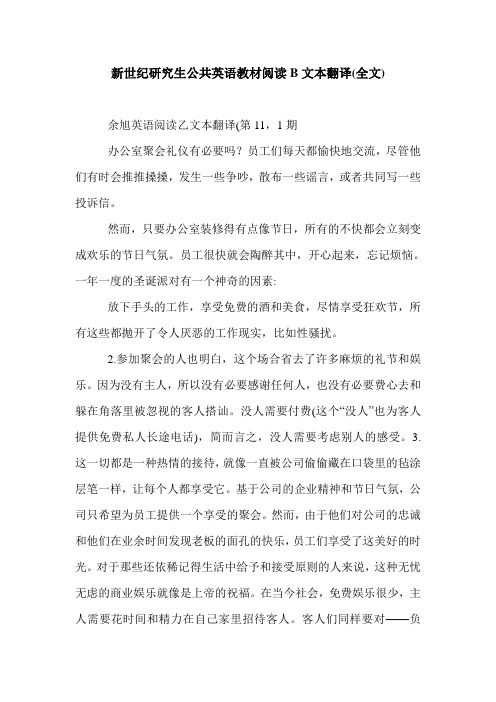
新世纪研究生公共英语教材阅读B文本翻译(全文)余旭英语阅读乙文本翻译(第11,1期办公室聚会礼仪有必要吗?员工们每天都愉快地交流,尽管他们有时会推推搡搡,发生一些争吵,散布一些谣言,或者共同写一些投诉信。
然而,只要办公室装修得有点像节日,所有的不快都会立刻变成欢乐的节日气氛。
员工很快就会陶醉其中,开心起来,忘记烦恼。
一年一度的圣诞派对有一个神奇的因素:放下手头的工作,享受免费的酒和美食,尽情享受狂欢节,所有这些都抛开了令人厌恶的工作现实,比如性骚扰。
2.参加聚会的人也明白,这个场合省去了许多麻烦的礼节和娱乐。
因为没有主人,所以没有必要感谢任何人,也没有必要费心去和躲在角落里被忽视的客人搭讪。
没人需要付费(这个“没人”也为客人提供免费私人长途电话),简而言之,没人需要考虑别人的感受。
3.这一切都是一种热情的接待,就像一直被公司偷偷藏在口袋里的毡涂层笔一样,让每个人都享受它。
基于公司的企业精神和节日气氛,公司只希望为员工提供一个享受的聚会。
然而,由于他们对公司的忠诚和他们在业余时间发现老板的面孔的快乐,员工们享受了这美好的时光。
对于那些还依稀记得生活中给予和接受原则的人来说,这种无忧无虑的商业娱乐就像是上帝的祝福。
在当今社会,免费娱乐很少,主人需要花时间和精力在自己家里招待客人。
客人们同样要对——负责,从回答邀请,接受所有的安排,到礼貌地称赞晚会完美的表现。
5.商务娱乐似乎把所有的时间、精力、金钱、个人义务和各种礼仪负担都放在一边。
聚会的组织者支付了费用,所以参加聚会的客人不必担心会有负罪感。
一年一次的圣诞节应该给低层员工一个理想的氛围,也就是说,公司赞助的聚会可以全年免费参加。
6.不要想得太漂亮。
严肃礼貌的小姐却从未离开(员工,更不用说雇主,这次真的很幸运,因为她只在党委工作,不在文具电话库存委员会工作)。
公司聚会不同于私人聚会,但礼仪一点也没有改变。
7.如果客人在没有礼节的情况下玩得很开心,那么礼仪小姐很乐意去度假。
研究生英语课文翻译Unit-12
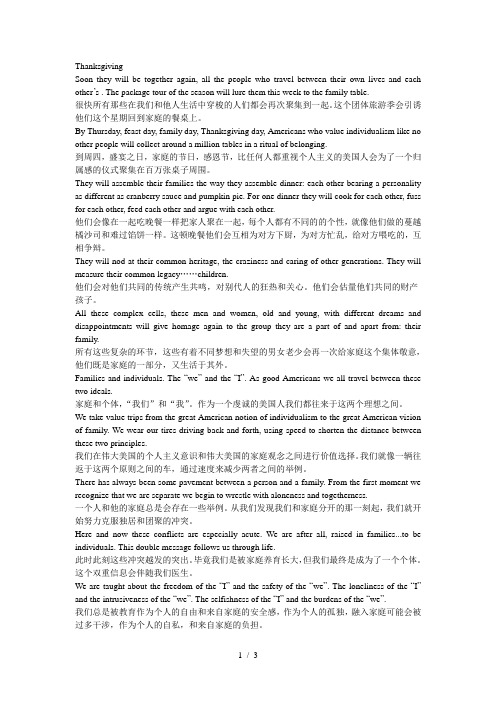
ThanksgivingSoon they will be together again, all the people who travel between their own lives and each other’s . The package tour of the season will lure them this week to the family table.很快所有那些在我们和他人生活中穿梭的人们都会再次聚集到一起。
这个团体旅游季会引诱他们这个星期回到家庭的餐桌上。
By Thursday, feast day, family day, Thanksgiving day, Americans who value individualism like no other people will collect around a million tables in a ritual of belonging.到周四,盛宴之日,家庭的节日,感恩节,比任何人都重视个人主义的美国人会为了一个归属感的仪式聚集在百万张桌子周围。
They will assemble their families the way they assemble dinner: each other bearing a personality as different as cranberry sauce and pumpkin pie. For one dinner they will cook for each other, fuss for each other, feed each other and argue with each other.他们会像在一起吃晚餐一样把家人聚在一起,每个人都有不同的的个性,就像他们做的蔓越橘沙司和难过馅饼一样。
这顿晚餐他们会互相为对方下厨,为对方忙乱,给对方喂吃的,互相争辩。
新世纪研究生公共英语教材阅读B_课后词汇题及答案(1至8章全)
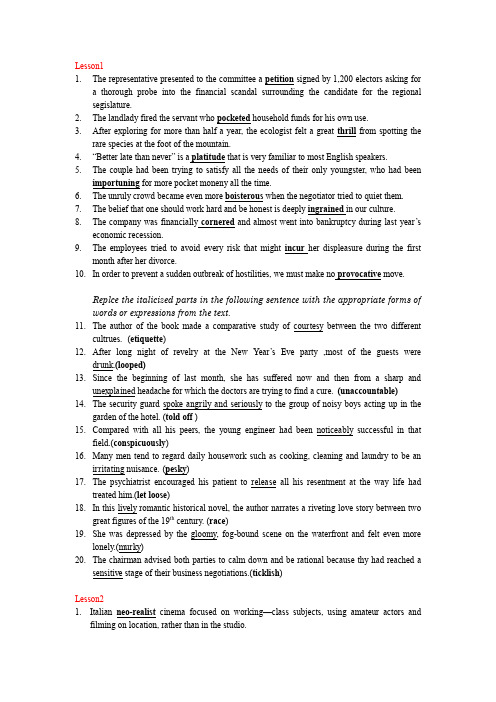
Lesson11.The representative presented to the committee a petition signed by 1,200 electors asking fora thorough probe into the financial scandal surrounding the candidate for the regionalsegislature.2.The landlady fired the servant who pocketed household funds for his own use.3.After exploring for more than half a year, the ecologist felt a great thrill from spotting therare species at the foot of the mountain.4.“Better late than never” is a platitude that is very familiar to most English speakers.5.The couple had been trying to satisfy all the needs of their only youngster, who had beenimportuning for more pocket moneny all the time.6.The unruly crowd became even more boisterous when the negotiator tried to quiet them.7.The belief that one should work hard and be honest is deeply ingrained in our culture.8.The company was financially cornered and almost went into bankruptcy during last year’seconomic recession.9.The employees tried to avoid every risk that might incur her displeasure during the firstmonth after her divorce.10.In order to prevent a sudden outbreak of hostilities, we must make no provocative move.Replce the italicized parts in the following sentence with the appropriate forms of words or expressions from the text.11.The author of the book made a comparative study of courtesy between the two differentcultrues. (etiquette)12.After long night of revelry at the New Year’s Eve party ,most of the guests weredrunk.(looped)13.Since the beginning of last month, she has suffered now and then from a sharp andunexplained headache for which the doctors are trying to find a cure.(unaccountable)14.The security guard spoke angrily and seriously to the group of noisy boys acting up in thegarden of the hotel. (told off )pared with all his peers, the young engineer had been noticeably successful in thatfield.(conspicuously)16.Many men tend to regard daily housework such as cooking, cleaning and laundry to be anirritating nuisance. (pesky)17.The psychiatrist encouraged his patient to release all his resentment at the way life hadtreated him.(let loose)18.In this lively romantic historical novel, the author narrates a riveting love story between twogreat figures of the 19th century. (race)19.She was depressed by the gloomy, fog-bound scene on the waterfront and felt even morelonely.(murky)20.The chairman advised both parties to calm down and be rational because thy had reached asensitive stage of their business negotiations.(ticklish)Lesson21.Italian neo-realist cinema focused on working—class subjects, using amateur actors andfilming on location, rather than in the studio.2.Despite his wartime atrocities,(暴行)Hitler is still revered by neo-Nazi in many countries.3.Neo-fascist groups are an increasing threat to ethnic minorities across Europe.4.By neocolonialism we mean the practice of granting a sort of independence with theconcealed intention of making a liberated country a client—state.5.The tutor tried hard to dissuade(阻止) students from using neologism in formal writing.6.He is a neo-Darwinis t who always preaches that the evolutionary development of plants andanimals is principally determined by natural selection, and that acquired characteristics cannot be inherited.7.The architect traveled around the whole of Europe seeking Palladio’s wonderful 16th-centuryneo-classical buildings.8.In view of the still unknown physical risks that cloning might impose on neonates, caution isappropriate.9.The challenge for the future lies in fostering conditions in cities that will be favorable toeconomic growth.10.The old lady raved about her grandchildren for about an hour.11.Gene therapy-----the actual correction or replacement of defective gene sequences in theembryo or the adult ------is the holy grail of genetic medicine.12.Through genetic engineering, will scientists be tampering with the genetic diversity that hasbeen the mainstay of human survival in the past?13.A news release by the Chinese Ministry of Personnel printed in a few leading newspapers andon news websites caught the attention of thousands of twenty-somethings in October.14.For many reasons, the vast majority of heterosexuals still prefer the “old—fashioned”,sexual way of producing children. No other method better expresses the loving union of a man and a woman seeking to make a baby.15.It is absolutely mandatory that every driver of a vehicle must pass a driver’s license test.16.In today’s lightning—speed world many singles are embracing the newest trend inrelationship ----- speed dating-------to size up a potential love interest.17.As a young man, he spent a lot of time meditating upon the purpose of life.18.She really enjoyed the film because it was a(n) fusion of history and contemporary events.Lesson 31.In China, home computer ownership is expected to exceed that of the U.S. and Europecombined. ( outstrip )2.The company has been placed in a state of uncertainty as the board decides what to donext.( limbo)3.He wrote quickly, but from time to time the stopped and outbreak of civil war. ( ceased)4.Thousands of refugees left the country following the outbreak of civil war.( in the wake of)5.An airline spokesman stated that the safety of passengers was absolutely of the most important.(paramount)6.The use of animals in scientific tests raises difficult moral questions. (ethical) coverage of the match had to be extended when it went into over—time.(prolonged)8.He’s a good person to be with if ever you’re in a tough situation. ( thorny)9.He seemed to be a born liar. ( congenital)10.The operation was rather painful, but I felt a lot better afterwards. (subsequently)11.In the Netherlands euthanasia has already been legalized.12.Some observers doubt whether the peace process can be salvagedck of essential minerals can cause deformity in unborn children.14.All the cars are tested for defects before they leave the factory15.We help people with mental or physical handicaps to find work16.She had a(n) lingering sense of guilt for some time after breaking off her relationship withHenry.17.The Government has to grapple with the problem of unemployment.18.He was arrested for allegedly stabbing his former wife19.To her relief she was acquitted of all the charges laid against her.20.The frontiers of medical knowledge are being pushed farther outwards as time goes on.Lesson 41.Westerners perceive shape and dimensions. (size)2.see cross—cultural varieties of spatial perception (types)3.any intrusion of one activity into a space (penetration)4.essence of beauty the Japanese call “shibumi”(core)5.the word means “in a house” or “from a chamber”(room)6.adaptations to specific environment (adjustments)7.the amount of distinguishing landmarks in a region (distinctive)8.make careful distinctions among different spatial elements (differentiation)9.secular and sacred activities are kept apart. (holy)10.different perceptions of time may cause cultural conflicts. (clashes)11.Time is not a “mere connection”, as some English anthropologists would lead us to believe,but one of the most basic organizing systems of life, because all situational behavior has a temporal and a spatial dimension.12.Patterns are those implicit cultural rules by means of which sets are arranged so that theytake on meaning.13.In fact, compared with more tangible assaults on his character------namely Jones’pendingsexual—harassment lawsuit and the federal investigation into White—water ------words in a book could barely hurt him.14.A small but persistent group of critics, many of them supported by the oil and coal industries,still don’t buy it.15.Mr. Smith, who was worried that the ban might infringe on the rights of law—abiding gunowners , had already voted against the bill.16.After all, scientists noted, HIV is a retrovirus, a class of infectious agents known for theiralarming ability to integrate their own genes into the DNA of the cells they infect.17.Suddenly, perfectly secular folks were throwing around words like sanctity and dredging upmedieval—era arguments against the hubris of science.18.My study of space---- how people experience it and create a model of the spatial world in thecentral nervous system-----forced me to acknowledge the perceptual clichés of my culture. 19.My ignorance of both hydroponics and of florist’s shops made me feel somewhat ill at ease.Consequently I did not communicate in the manner I generally use when I am speaking on afamiliar subject in a familiar setting.20.To understand an organization, you have to consider all of its components. Organizations arenetworks of related parts. Each element works together with the others to support efficient operations. The new MBA buzzword for it all is Organizational Architecture.Lesson 51.sat in rapt attention (complete; engrossed)2.pay for the use of the inn’s facilities (resources; means)3. a seemingly intelligent couple condone behavior that is so obviously rude (overlook; ignore)4.witness the abominable display (contemptible)paring assessments of (appraisals)6.her friend’s mother was livid (furious)7.learn to behave more gallantly than they feel (bravely; politely)8.call a neighbor a jerk (idiot; fool)9.become aggressive, demanding and rude at the slightest provocation(irritation; annoyance)10.the result of thoughtlessness rather than of deliberate aggression. (intentional; purposeful)11.It is not our desire to be provocative, but the status quo cannot continue. Neither can thepresent standoff, without the danger of a more serious confrontation that nobody wants.12.Like all derivatives, they function, essentially, as bets on the direction of particular markets.So coveted is such insurance that the total face amount -----or “notional value”-----of swaps and similar contracts has soared to an astronomical $11 trillion.13.Annoyed, shareholders have moved to curb such abuses-----just as they have moved toremove a number of CEOs in recent months.14.The day was star—crossed, Friday, October 13th, on the eve of the second anniversary of a(n)devastating market crash.15.In a(n) appalling demonstration of the mistreatment of recruits and their meager food rations,in March 1993 four sailors on Russky Island in the Far East died of malnutrition.16.Even more interesting, from a business perspective,is the so—called intranet----thecollection of networks that connect computers within corporations---- that both Sun and Microsoft have targeted as a rich area for growth.17.She was at times less successful winning over her counterpart at the U.N., who, likeNapoleon’s army, travels on his stomach.18.Members of the NASA—led team arrived in Washington fully prepared to enter the fray.19.Negotiation could sometimes defuse these situations and produce more acceptableconsequences for both parties.20.It may not seem much consolation to point out that the teacher, too, becomes frustrated whenhis efforts appear to produce less than obvious result.Lesson 61.Marsgall’s skills and her pleasant and sociable personality made her very effective in herpublic relations job. (outgoing)2.Mary was small, pretty, and very ambitious (petite)3.He has always strongly and clearly denied the allegations. (emphatically)4.On the surface Dana was calm and self—assured, but I knew that this wasn’t completely thecase. (self-possessed)5.Many of its best—educated residents have been driven to neighboring counties in search ofbetter jobs. (quest)6.He was certainly the most attractive and pleasant lecturer there. (personable)7.For a while she imagined that she was a rich woman, living in a beautiful house. (fantasized)8.I like the idea of getting married but I don’t accept the traditional view of what marriageshould be all about. (buy into)9.They decided to postpone the wedding until Pam’s mother was out of the hospital (defer)10.The government got involved in a bitter dispute between the miners and theiremployers.( caught up)11.Fathers are encouraged to be more involved with their families.12.Edinburgh sees itself as a university of the new millennium, committed to research andteaching.13.I couldn’t figure out who the lady with the sunglasses was.14.Researchers are convinced that there is a genetic cause for the disease.15.Spatial mobility tends to be highest among the most affluent groups on the one hand and thepoorest on the other.16.She didn’t want to be tied down by a full-time job.17.She loves her life and is immersed in the quest for knowledge for knowledge’s sake.18.It seems like everybody in America is looking for the end of the rainbow19.Some claim that the herb has therapeutic value for treating pain.20.She has lots of good ideas, but she has difficulty formulating them.Lesson 71.The old lady complained continuously about the way her granddaughters dressed.(carped)2.His painting gave a concrete form to the spirit of the age.(embodied)3.The poor couple suffered great pain every night over the decision to send their sons to schooland keep their only daughter at home to help with farming work.(agonized)4.He issued an open and direct denial of the story that he was involved in bribery.(outright)5.Bill looked hard at the computer screen, wondering what his programming mistakewas.(peered)6.Mary’s parents knew clearly that their daughter’s poor scores would keep her out of anyprestigious university.(mediocre)7.The company was flooded with application letters after their advertisement for newemployees appeared in local newspapers.(inundated)8.The manager stubbornly opposed the suggestion to reduce his staff despite his failingbusiness.(bucked)9.John Bull is always speaking sharply to the workers for no apparent reason.(snarling at )10.The rain came gradually to a stop before we got started.(petered out)11.Gas lamps became obsolete when electric lighting became popular.12.It is ver hard for me not to wince when I see a nurse putting a needle into my arm.13.No one would deny that the marathon is the most grueling event in the sports meet.14.The whizzed through the rehearsal so that there would be time for a short meeting.15.The film star made a(n) pretentious speech to journalists, stating that he only cared about art,not wealth.16.The senator squelched the reporters who tried to interrupt him during his speech.17.It took a long time for him to mull over the whole thing before eventually making a decision.18.It was exciting to see such a movie for the first time, but we soon became jaded when ourTV was flooded with programs of a similar kind.19.Jane hoped her new housemaid could be trusted, but she will had some misgivings.20.When the war broken out, a large number of refugees crossed the border, seeking sanctuaryin the neighboring country.21.Fame happened almost overnight for the 25-year-old actress, but she has been unfazed by allthe recent media attention.22.The man posed as a health-worker in order to get into the old lady’s house, and then stole hermoney.23.Years ago, people would have scoffed at the notion that robots would operate on patientsinstead of surgeons.24.Mrs. Williams was upset when she heard that her son had misbehaved at school.Lesson 81.This hostile and aggressive attitude towards the host country evidently grows out of thegenuine difficulty which the visitor experiences in the adjustment process.2.Many teachers have stereotyped opinions concerning naughty pupils.3.It is natural for people to have hope, admiration, and jealousy. To inhibit such feelings is cruelbecause it goes against human nature.4.Some research suggests that woman with masculine-sounding names such as “Sam”and“Chris” are more successful in the business world.5.It’s said that in Slav areas it is not wise to nod approval or shake one’s head in disapproval,because the meanings of these gestures are opposite to the anglicized cultural meanings.6.In this poverty—stricken area, many of the families are forced to live at the subsistence level.7.We must first understand the ordinary rules of stability and the pervasive patterns of naturalhistory before we can speculate on the origin of the major body plants.8.He was only able to perceive black and white: he could not see properly.9.In recent years, young parents, female professionals, and well-educated parents are morelikely to socialize their children into more equal gender roles.10.Men are more prone to revenge injuries than to requite kindness, says Thomas Fuller.。
(王哲)新世纪研究生公共英语教材 Reading B课文翻译

新世纪研究生公共英语教材Reading BUnit 31. 在特效药、风险性手术进程、放疗法以及特护病房方面的医学进展已为数千人带来新生。
然而,对于他们中不少人而言,现代医学已成为一把双刃剑。
2. 医生采用一系列航空时代技术进行治疗的能力已超过人体本身的治愈能力。
从医学的角度来说,有更多的疾病能够得以诊治,可对于许多病人而言,复原的希望却微乎其微。
甚至生死之间的基本差别也难以界定清楚。
3. 不少美国人身陷医学囹圄,形同南韩拳击手金得九(Duk Koo Kim)的境遇。
金得九在一次打斗中受到重击,人事不省,大脑停止运转,只能依靠人为方法赖以存活。
经其家人允许,拉斯维加斯的医生切断了维持其生命的器械,死神便接踵而来。
4. 医疗技术进步了,是力求生存还是注重生命质量,哪个目标更为重要,这一问题在全美的医院和疗养院里引发了激烈的争论。
5. “归根结底,问题在于,医疗的宗旨是什么?”位于纽约哈德逊河上黑斯廷斯的社会、伦理及生命科学学会主席丹尼尔·卡拉汉说,“是真的要挽救生命还是要为病人谋取更大的利益?”6. 医生、病患、家属,通常还有法庭都不得不在医疗方面作出艰难的抉择。
而这些道德难题往往最容易产生于生命的两个极端——生命开初的重病新生儿和生命终端的垂死病患。
7. 这些因现代医学技术而产生的两难问题已不断催生出生物伦理学的新准则。
如今,全美127家医学院中已有不少机构开设了医学伦理学课程,要在十年前,根本没人会去注意这个领域。
不少医院的员工队伍都包含了牧师、哲学家、精神病医师以及社会工作者,以求帮助病人作出关键性抉择,而有二十分之一的机构专门成立了伦理委员会解决这些难题。
死亡和垂死8. 在所有特护病房的垂死病人当中,有约莫20%的病例,其当事人面临艰难的道德抉择——是继续尽力挽救生命还是改变初衷、听凭病患死去。
对于是否要维持生命的治疗,不少病房每周大约要作三次决定。
9. 现在就连死亡的定义也已经改变。
(完整word版)unit12课文翻译MicrosoftWord文档
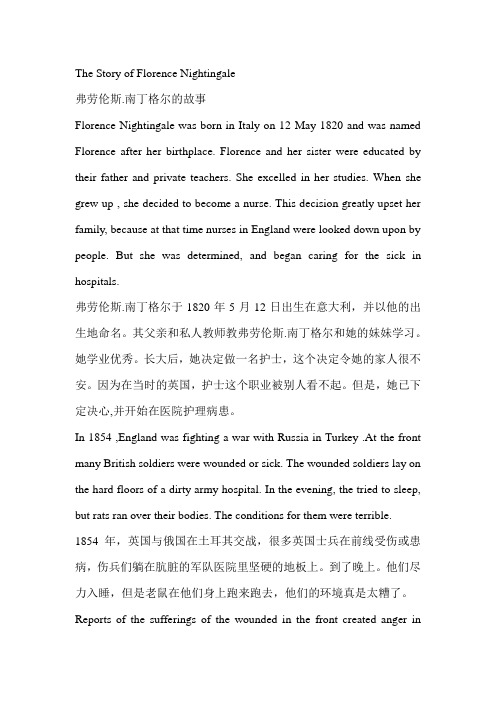
The Story of Florence Nightingale弗劳伦斯.南丁格尔的故事Florence Nightingale was born in Italy on 12 May 1820 and was named Florence after her birthplace. Florence and her sister were educated by their father and private teachers. She excelled in her studies. When she grew up , she decided to become a nurse. This decision greatly upset her family, because at that time nurses in England were looked down upon by people. But she was determined, and began caring for the sick in hospitals.弗劳伦斯.南丁格尔于1820年5月12日出生在意大利,并以他的出生地命名。
其父亲和私人教师教弗劳伦斯.南丁格尔和她的妹妹学习。
她学业优秀。
长大后,她决定做一名护士,这个决定令她的家人很不安。
因为在当时的英国,护士这个职业被别人看不起。
但是,她已下定决心,并开始在医院护理病患。
In 1854 ,England was fighting a war with Russia in Turkey .At the front many British soldiers were wounded or sick. The wounded soldiers lay on the hard floors of a dirty army hospital. In the evening, the tried to sleep, but rats ran over their bodies. The conditions for them were terrible. 1854年,英国与俄国在土耳其交战,很多英国士兵在前线受伤或患病,伤兵们躺在肮脏的军队医院里坚硬的地板上。
新世纪研究生公共英语阅读B第十二单元课文翻译

雷华德•加德纳科技在学校里发起了一场革命。
教育界人士应该迎头赶上,积极应变了。
1. 如果真有一个人能够神奇地从一九零零年来到我们现在这个时代,那么他对于今天教室里的情形大多觉得似曾相识——上课方式一成不变、练习重视有加、材料脱离上下文、课堂活动不是枯燥无味的阅读就是每周一次的拼写测验。
可能除了教堂外,没有哪个机构会象肩负着下一代人的正规教育责任的学校一样根本没有发生变化。
2. 学校里静如止水,跟围墙外面孩子的经历形成了极大的反差。
在现代社会里,孩子得以接触到各种各样的媒体:电视机、移动电话、带有光盘驱动器的个人电脑、传真机、影碟、个人立体音响、照相机、摄影机——早些年这些东西简直让人难以想象。
(在工业化程度不那么发达的国家或地区,它们仍然令人诧异不已。
)3. 旧时代的人可以轻而易举地辨认出今天的课堂,但却很难理解现代社会十岁孩子的校外世界。
说老实话,我自己经常遇到那样的困难。
4. 如果不把学校教育视作泛指意义的教育,那么它本来就应该是比较保守的。
我还是很赞同这种保守思想的。
但当今世界的变化实在是太快、太重要了。
学校不可能老是维持过去的样子或只是做一点表面的调整。
真的,如果学校不能快速从根本上改变自己,就可能会被其它积极应变的机构所代替(虽然那些机构也许还不够舒适、不够合法)。
5. 当今时代最重要的科技大事就是电脑主宰一切。
从通讯传输到个人簿记及娱乐方式,电脑在生活的许多方面已经起到了很重要的作用。
许多学校几乎没有注意到这个趋势,直到现在才购买电脑,建立网络。
虽然经常是用更为便捷有效的工具去上同样的课,但不妨这么说,科技产品已经渗入了校园生活。
6. 然而将来的教育大多是要围绕电脑进行的。
电脑允许有一定的个性化——个人辅导或学习——过去只有有钱人才能这么做。
现在学生上课可以根据他们的需要、学习方式、进度和学习情况及过往的成绩来量身定做。
确实如此,有史以来第一次,电脑可以帮助我们实现面向全世界学生的“个性化”和“积极亲身学习”的教育革新思想。
新世纪研究生公共英语教材阅读BUnitWord版
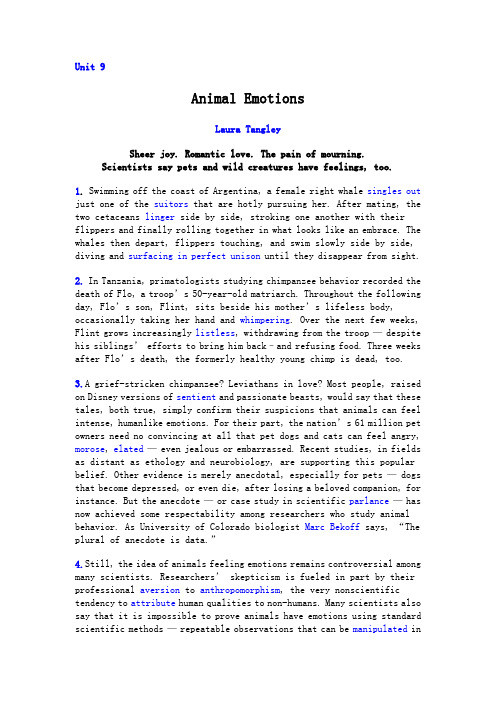
Unit 9Animal EmotionsLaura TangleySheer joy. Romantic love. The pain of mourning.Scientists say pets and wild creatures have feelings, too.1. Swimming off the coast of Argentina, a female right whale singles out just one of the suitors that are hotly pursuing her. After mating, the two cetaceans linger side by side, stroking one another with their flippers and finally rolling together in what looks like an embrace. The whales then depart, flippers touching, and swim slowly side by side, diving and surfacing in perfect unison until they disappear from sight.2.In Tanzania, primatologists studying chimpanzee behavior recorded the death of Flo, a t roop’s 50-year-old matriarch. Throughout the following day, Flo’s son, Flint, sits beside his mother’s lifeless body, occasionally taking her hand and whimpering. Over the next few weeks, Flint grows increasingly listless, withdrawing from the troop —despite his siblings’ efforts to bring him back–and refusing food. Three weeks after Flo’s death, the formerly healthy young chimp is dead, too.3.A grief-stricken chimpanzee? Leviathans in love? Most people, raised on Disney versions of sentient and passionate beasts, would say that these tales, both true, simply confirm their suspicions that animals can feel intense, humanlik e emotions. For their part, the nation’s 61 million pet owners need no convincing at all that pet dogs and cats can feel angry, morose, elated—even jealous or embarrassed. Recent studies, in fields as distant as ethology and neurobiology, are supporting this popular belief. Other evidence is merely anecdotal, especially for pets — dogs that become depressed, or even die, after losing a beloved companion, for instance. But the anecdote —or case study in scientific parlance—has now achieved some respectability among researchers who study animal behavior. As University of Colorado biologist Marc Bekoff says, “The plural of anecdote is data.”4.Still, the idea of animals feeling emotions remains controversial among many scientists. Researchers’ skepticism is fueled in part by t heir professional aversion to anthropomorphism, the very nonscientific tendency to attribute human qualities to non-humans. Many scientists also say that it is impossible to prove animals have emotions using standard scientific methods —repeatable observations that can be manipulated incontrolled experiments —leading them to conclude that such feelings must not exist. Today, however, amid mounting evidence to the contrary, “the tide is turning radically and rapidly,” says Bekoff, who is at the forefront of this movement.5.Even the most strident skeptics of animal passion agree that many creatures experience fear —which some scientists define as a “primary” emotion that contrasts with “secondary” emotions such as love and grief. Unlike these more complex feelings, fear is instinctive, they say, and requires no conscious thought. Essential to escape predators and other dangers, fear — and its predictable flight, fight, or freeze responses — seems to be hard-wired into many species. Young geese that have never before seen a predator, for example, will run for cover if a hawk-shaped silhouette passes overhead. The shape of a nonpredatory bird, on the other hand, elicits no such response.6.But beyond such instinctual emotions and their predictable behavioral responses, the possibility of more complex animal feelings —those that entail mental processing —is difficult to demonstrate. “I can’t even prove that another human being is feeling happy or sad,” says Bekoff, “but I can deduce how they’re feeling through body language and facial expression.” As a scientist who has conducted field studies of coyotes, foxes, and other canines for the past three decades, Bekoff also believes he can accurately tell what these animals are feeling by observing their behavior. He adds that animal emotions may actually be more knowable than those of humans, because they don’t “filter” their feelings the way we do.7.Yet because feelings are intangible, and so tough to study scientifically, “most researchers don’t even want to talk about animal emotions,” says Jaak Panksepp, a neuroscientist at Bowling Green State University in Ohio and author of Affective Neuroscience. Within his field, Panksepp is a rare exception, who believes that similarities between the brains of humans and other animals suggest that at least some creatures have true feelings. “Imagine where we’d be in physics if we hadn’t inferred what’s inside the atom,” says Panksepp. “Most of what goes on in nature is invisible, yet we don’t deny that it exists.”8.The new case for animal emotions comes in part from the growing acceptability of field observations, particularly when they are taken in aggregate. The latest contribution to this body of knowledge is a new book, The Smile of a Dolphin, which presents personal reports from more than 50 researchers who have spent their careers studying animals —from cats, dogs, bears, and chimps to birds, iguanas, and fish. Edited by Bekoff, who says it w ill finally “legitimize” research on animal emotions, the volume has alreadygarnered scientific attention, including a Smithsonian Institution symposium on the subject.9. One of the most obvious animal emotions is pleasure. Anyone who has ever held a purring cat or been greeted by a bounding, barking,tail-wagging dog knows that animals often appear to be happy. Beastly joy seems particularly apparent when the animals are playing with one another or sometimes, in the case of pets, with people.10.Virtually all young mammals, as well as some birds, play, as do adults of many species such as our own. Young dolphins, for instance, routinely chase each other through the water like frolicsome puppies and have been observed riding the wakes of boats like surfers. Primatologist Jane Goodall, who has studied chimpanzees in Tanzania for four decades, says that chimps “chase, somersault, and pirouette around one another with the abandon of children.” In Colorado, Bekoff once watched an elk race back and forth across a patch of snow — even though there was plenty of bare grass nearby —leaping and twisting its body in midair on each pass. Though recent research suggests that play may help youngsters develop skills needed in adulthood, Bekoff says there’s no question that it’s also fun. “Animals at play are symbols of the unfettered joy of life,” he says11.Grief also seems to be common in the wild, particularly following the death of a mate, parent, offspring, or even close companion. Female sea lions witnessing their pups being eaten by killer whales are known to actually wail. When a goose, which mates for life, loses its partner, the bird’s head and body droop dejectedly. Goodall, who saw the young chimp Flint starve after his mother died, maintains that the animal “died of grief.”12.Elephants may be nature’s best-known mourners. Scientists studying these behemoths have reported countless cases of elephants trying to revive dead or dying family members, as well as standing quietly beside an animal’s remains for many days, periodically reaching out and touching the body with their trunks. Kenyan biologist Joyce Poole, who has studied African elephants since 1976, says these animals’ behavior toward their dead “leaves me with li ttle doubt that they experience deep emotions and have some understanding about death.”13.But there’s “hard” scientific evidence for animal feelings as well. Scientists who study the biology of emotions, a field still in its infancy, are discovering many similarities between the brains of humans and other animals. In animals studied so far, including humans, emotions seem toarise from ancient parts of the brain that are located below the cortex, regions that have been conserved across many species throughout evolution.14.The most important emotional site identified so far is the amygdala, an almond-shape structure in the center of the brain. Working with rats, neuroscientists have discovered that stimulating a certain part of the amygdala induces a state of intense fear. Rats with damaged amygdalas, on the other hand, do not show normal behavioral responses to danger (such as freezing or running) or the physiological changes associated with fear — higher heart rate and blood pressure, for example.15.In humans, brain-imaging studies show that when people experience fear, their amygdalas, too, are activated. And just like the rats, people whose amygdalas are damaged by accident or disease seem unable to be afraid when the situation warrants it. In humans and rats, at least, amygdalas are “basically wired the same way,” says New York University neuroscientist Joseph LeDoux, whose lab conducted much of the rat research. He adds that beyond fear, “the evidence is less clear, but the amygdala is implicatedin other emotions as well.”16.The case for animal emotions is also bolstered by recent studies of brain chemistry. Steven Siviy, a behavioral neuroscientist at Gettysburg College in Pennsylvania, has found that when rats play, their brains release copious amounts of dopamine, a neurochemical that is associated with pleasure and excitement in humans. In one experiment, Siviy placed pairs of rats in a distinctive plexiglass chamber and allowed them to play. After a week, he could put one animal alone in the chamber and, anticipating its upcoming play s ession, it would become “very active, vocalizing, and pacing back and forth with excitement.” But when Siviy gave the same animal a drug that blocks dopamine, all such activity came to a halt. Neuroscientist Panksepp has found evidence that rats at play also produce opiates–chemicals that, like dopamine, are thought to be involved with pleasure in people.17.Another chemical, the hormone oxytocin, is associated with both sexual activity and maternal bonding in people. It is released, for example, when mothers are nursing their infants. Now it looks as though the same hormone affects attachment among animals, at least in the case of a mouselike rodent called the p rairie vole. To investigate oxytocin’s role in social bonding, University of Maryland neuroscientist C. Sue Carter targeted the vole because it is one of the few mammal species known to be monogamous. She found that females, who normally spend about a day selecting a mate from a pool of eager males, will choose one within an hour — often the first male they see —if they have first received an injection of oxytocin. Voles given a drug that blocks oxytocin, however, will not select a mate, no matter how much time they have. Carter concludes that pair bonding in voles relies at least in part on oxytocin, which produces behavior that looks much like people who are “falling in love.”18.But is it love, really? Bernd Welsig, the Texas A&M University biologist who observed amorous right whales off the coast of Argentina, believes that, as a scientist, “I should probably call this event a mere example of an ‘alternative mating strategy.’ “ But Welsig still entertains the possibility that the cetaceans behaved the way they did because “they were the ‘right’ right whales for each other.”19.Skeptics remain unconvinced. “A whale may behave as if it’s in love, but you can’t prove what it’s feeling, if anything,” says neuroscientist LeDoux, author of The Emotional Brain. He maintains that the question of feelings boils down to whether or not animals are conscious. And though animals “may have snapshots of self-awareness,” he says, “the movie we call consciousness is not there.” Richard Davidson, a neuroscientist at the University of Wisconsin-Madison, agrees that higher primates, including apes and chimps, are the only animals that have demonstrated self-consciousness so far. Still, he believes that there are other creatures that “may at least have antecedents of feelings.”20.Or probably more, say Bekoff and his colleagues. Their most convincing argument, perhaps, comes from the theory of evolution, widely accepted by biologists of all stripes. Citing similarities in the brain anatomy and chemi stry of humans and other animals, neuroscientist Siviy asks: “If you believe in evolution by natural selection, how can you believe that feelings suddenly appeared, out of the blue, with human beings?” Goodall says scientists who use animals to study the human brain, then deny that animals have feelings, are “illogical.”21. In the end, what difference does it really make? According to many scientists, resolving the debate over animal emotions could turn out to be much more than an intellectual exercise. If animals do indeed experience a wide range of feelings, it has profound implications for how humans and animals will interact in the future. Bekoff, for one, hopes that greater understanding of what animals are feeling will spur more stringent rules on how animals should be treated, everywhere from zoos and circuses to farms and backyards.22.But if there is continuity between the emotional lives of humans and other animals, where should scientists draw the line? Michel Cabanac, a physiologist at Laval University in Quebec, believes that consciousness arose when animals began to experience physical pleasure and displeasure. In experiments with iguanas, he discovered that the animals show physiological changes that are associated with pleasure in mammals — a rise in body temperature and heart rate —whereas frogs and fish do not. He proposes that emotions evolved somewhere between the first amphibians and reptiles. Yet even enthusiasts don’tascribe emotions to the very bottom end of the food chain. Says Bekoff: “We’re not going to talk about jealous sponges and embarrassed mosquitoes.”<The End>第九单元动物的情感劳拉·坦利非常的开心。
新世纪研究生公共英语《阅读B》Uite10课文译文
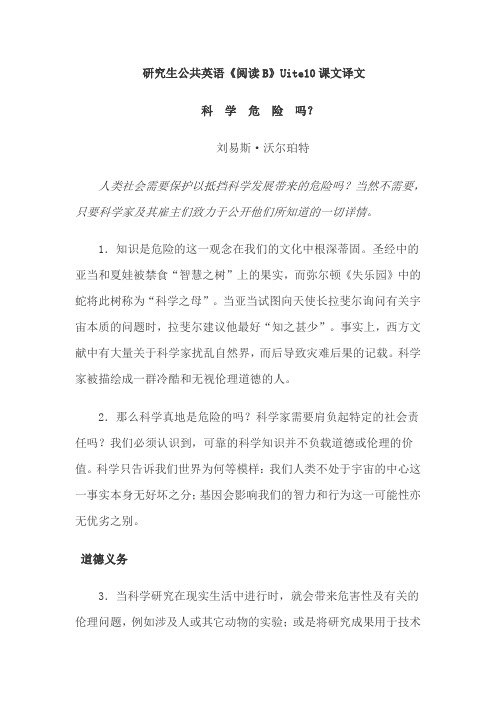
研究生公共英语《阅读B》Uite10课文译文科学危险吗?刘易斯·沃尔珀特人类社会需要保护以抵挡科学发展带来的危险吗?当然不需要,只要科学家及其雇主们致力于公开他们所知道的一切详情。
1.知识是危险的这一观念在我们的文化中根深蒂固。
圣经中的亚当和夏娃被禁食“智慧之树”上的果实,而弥尔顿《失乐园》中的蛇将此树称为“科学之母”。
当亚当试图向天使长拉斐尔询问有关宇宙本质的问题时,拉斐尔建议他最好“知之甚少”。
事实上,西方文献中有大量关于科学家扰乱自然界,而后导致灾难后果的记载。
科学家被描绘成一群冷酷和无视伦理道德的人。
2.那么科学真地是危险的吗?科学家需要肩负起特定的社会责任吗?我们必须认识到,可靠的科学知识并不负载道德或伦理的价值。
科学只告诉我们世界为何等模样:我们人类不处于宇宙的中心这一事实本身无好坏之分;基因会影响我们的智力和行为这一可能性亦无优劣之别。
道德义务3.当科学研究在现实生活中进行时,就会带来危害性及有关的伦理问题,例如涉及人或其它动物的实验;或是将研究成果用于技术实施;又或是相关的研究涉及到人们的安全问题。
由此可见,科学和技术之间有一重要区别:科学知识旨在了解自然,而技术却是运用这一知识制造产品或将这一知识运用于实际目的。
4.科学研究推导有关世界本质的观念,而技术观念则旨在制造可使用的产品。
技术远比科学源远流长。
而且没有科学的指引,单凭技术也发展了诸如农业和金属制造业之类的行业。
我认为19世纪之前,科学实际上未对技术做出太多的贡献——即使是那些辉煌的技术成果,如蒸汽机和文艺复兴时期的大教堂,也是在没有任何科学观念的影响下,通过当时人们富于想象的反复试验完成的。
5.无论发明什么样的技术,科学家均不应该对该技术的运用做涉及道德伦理方面的决策,因为他们在这方面没有任何特殊的权利或能力。
如果要求科学家承担更多的社会义务,并赋予他们特权进行相关的决策,那么将会出现严重的危机。
科学家所承担的社会责任有别于他们与其他公民共同分担的社会义务(例如支持民主社会或尊重他人权益),这种责任源于他们具备专业的知识去了解世界的本质,而普通人未能拥有这些知识。
新世纪研究生公共英语教材阅读 A unit 12 b
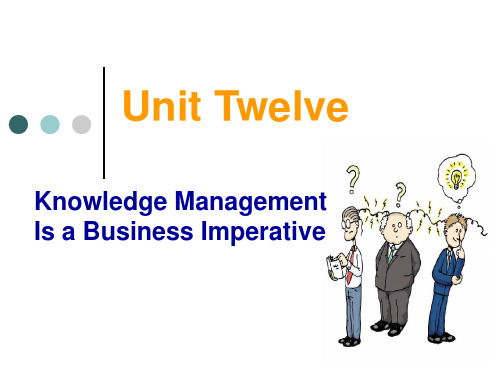
It can also act as a monitoring point that leverages knowledge for the rest of the business. Over time the cumulative knowledge and expertise within a center helps:
Definition:
所谓知识管理的定义为,在组织中建构 一个量化与质化的知识系统,让组织中 的资讯与知识,透过获得、创造、分享、 整合、记录、存取、更新、创新等过程, 不断的回馈到知识系统内,形成永不间 断的累积个人与组织的知识成为组织智 慧的循环,在企业组织中成为管理与应 用的智慧资本,有助于企业做出正确的 决策,以因应市场的变迁。
alert users to business opportunities and threats make valuable connections - putting people who have problems in touch with those who have solutions i.e. "knowing what we know" create communities - putting people in touch with each other who share similar needs and are tackling similar or related problems
A 'center' saves costs on generic information processes by:
economies of scale - saving the valuable time of professionals gaining discounts from suppliers because of bulk purchases - sourcing once, but distributing widely e.g. via an Intranet pooling expertise in a few locations avoiding duplication of purchase and unnecessary overlap reusing information and knowledge in different contexts targeting distribution according to interests, rather than mass distribution
新世纪研究生公共英语教材阅读AB课后题答案 精品
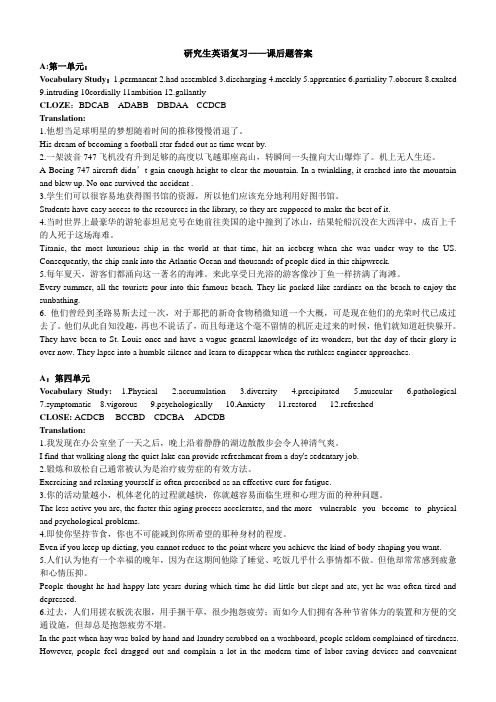
研究生英语复习——课后题答案A:第一单元:Vocabulary Study:1.permanent 2.had assembled 3.discharging 4.meekly 5.apprentice 6.partiality 7.obscure 8.exalted 9.intruding 10cordially 11ambition 12.gallantlyCLOZE:BDCAB ADABB DBDAA CCDCBTranslation:1.他想当足球明星的梦想随着时间的推移慢慢消退了。
His dream of becoming a football star faded out as time went by.2.一架波音747飞机没有升到足够的高度以飞越那座高山,转瞬间一头撞向大山爆炸了。
机上无人生还。
A Boeing 747 aircraft didn’t gain enough height to clear the mountain. In a twinkling, it crashed into the mountain and blew up. No one survived the accident .3.学生们可以很容易地获得图书馆的资源,所以他们应该充分地利用好图书馆。
Students have easy access to the resources in the library, so they are supposed to make the best of it.4.当时世界上最豪华的游轮泰坦尼克号在她前往美国的途中撞到了冰山,结果轮船沉没在大西洋中,成百上千的人死于这场海难。
Titanic, the most luxurious ship in the world at that time, hit an iceberg when she was under way to the US. Consequently, the ship sank into the Atlantic Ocean and thousands of people died in this shipwreck.5.每年夏天,游客们都涌向这一著名的海滩。
- 1、下载文档前请自行甄别文档内容的完整性,平台不提供额外的编辑、内容补充、找答案等附加服务。
- 2、"仅部分预览"的文档,不可在线预览部分如存在完整性等问题,可反馈申请退款(可完整预览的文档不适用该条件!)。
- 3、如文档侵犯您的权益,请联系客服反馈,我们会尽快为您处理(人工客服工作时间:9:00-18:30)。
雷华德•加德纳
科技在学校里发起了一场革命。
教育界人士应该迎头赶上,积极应变了。
1. 如果真有一个人能够神奇地从一九零零年来到我们现在这个时代,那么他对于今天教室里的情形大多觉得似曾相识——上课方式一成不变、练习重视有加、材料脱离上下文、课堂活动不是枯燥无味的阅读就是每周一次的拼写测验。
可能除了教堂外,没有哪个机构会象肩负着下一代人的正规教育责任的学校一样根本没有发生变化。
2. 学校里静如止水,跟围墙外面孩子的经历形成了极大的反差。
在现代社会里,孩子
上就提高了。
8. 美中不足的是,因特网上根本没有谁去把关,“谁都可以上网玩。
”真假信息鱼目混珠,到目前为止,还没有什么可靠的办法可以将网上的真假、是非区分开来。
民族志学家莎莉•特克尔指出,很多孩子始终认为,“税收提高了就总会有暴乱”,因为这是一个随处都可买得到的电脑游戏《山姆城》中提到的常识。
要学会辨别善恶、真假、美丑并知道当中有哪些是有必要了解的,这是一个巨大的挑战。
9. 也许有人会回应说,世界本来就充满了错误的信息。
没错,过去教育当局至少还可
以选择他们最喜欢的教材(并禁止使用其他教材)。
但今天谁都可以马上得到大量的资料,这在过去是绝无仅有的。
10. 人工智能与虚拟现实这两种电脑技术可能会对教育产生巨大的影响。
学校的大多数规划工作也许可以不用人而是由人所编制的程序来完成,以前需要通过课本和间中几次的实地调查来完成的工作现在可以在虚拟现实中完成。
人们不禁要问:这种完全由机器做出来的东西,其真实性到底如何呢?
11. 一改过去的趋势,从官方认可的机构获得学历证书可能也不那么重要了。
个人可以自学(如果不是全部内容也是大部分内容吧),并在模拟的背景中检验所学到的知识。
既然
16. 最后,近来生物医药方面的突破也可能会最彻底地改变教育。
如果个人可以通过基因工程来“设计”他们的后代,可以改变活人捐赠的细胞基因;如果有可能克隆人类或克隆人类成为现实,那么我们对于个人和个人作为社会成员的定义也将永远改变。
甚至连进化规律也不得不要重新构想了。
17. 前面说过,教育是保守的,保守思想不一定就是坏事。
确实,从价值观的传递以及某些符号系统和原理的掌握情况来看,还是很需要采取保守的方法的。
然而,知识爆炸和不断改变的原理又要求我们以新的眼光对教学设置的问题予以密切的关注。
年轻人扮演的角色
会不断地改变,要为他们做好准备,我们就得研究出新的教学方法来。
